- Home
- Ann M. Martin
Dawn and Whitney, Friends Forever Page 7
Dawn and Whitney, Friends Forever Read online
Page 7
Wrong.
To Mary Anne’s horror, it wasn’t just Mrs. Barrett who came through the door. It was Mrs. Barrett and Franklin and all four DeWitt children.
“No!” gasped Mary Anne, rising to her feet. In her usual Mrs. Barrett way, she’d changed plans on the spur of the moment.
“We can all cook dinner together!” Mrs. Barrett announced cheerfully.
“Ha,” said Buddy.
Mary Anne managed to head them off for a moment by persuading the DeWitt kids to sit down for a snack (Buddy and Suzi unceremoniously got up and went back to the den). But she wasn’t able to catch Mrs. Barrett’s eye and warn her, so Mary Ann flew through the house, snatching down signs and deactivating “traps.”
But she wasn’t fast enough. Suddenly she heard a shriek from the den. She raced in to see Lindsey sitting on one of the towel-covered chairs, a cloud of white powder floating in the air around her and powder all over her face and hair.
Buddy and Suzi burst out laughing. Then Taylor, who’d come in behind Mary Anne, saw the signs on the chairs. “What does that mean?” Taylor asked, pointing.
“That DeWitts aren’t welcome in our house. Or our family. We don’t need you. So there!” said Buddy.
“Buddy!” said Mary Anne.
Another cry sounded in the hall and Madeleine came in crying “Euw, euw, euwwww” and holding out her hands. Lindsey looked at Madeleine’s hands and said, “Gross. She’s got slimy stuff all over her hands.”
“The sign said that bathroom was for Barretts only. That’ll teach you to use our stuff without permission!” declared Suzi.
“Fine!” said Lindsey. “We don’t want anything to do with your stupid stuff or your stupid family, anyway. You can go, go, go fry your head in peanut butter.”
The DeWitts marched out, leaving Buddy and Suzi looking angry but triumphant.
* * *
Miraculously, Mrs. Barrett and Franklin didn’t seem to have yet noticed anything amiss. They were in the kitchen beginning preparations for dinner. Mary Anne helped, and, every chance she got, dashed out to move another sign or take apart another booby trap. But by the time she got ready to go, she hadn’t succeeded in finding them all.
She left Franklin and Mrs. Barrett in the kitchen, talking and laughing as they chopped vegetables for beef stew, while the Barretts sat in the den with the DeWitts, playing a silent, deadly game of Monopoly in the living room.
“Mine, mine, mine!” she heard Taylor say as she walked out the door.
“You know, I don’t think Buddy and Suzi are too happy with the idea of sharing their family with the DeWitts,” Mary Anne said to Mrs. Barrett as she left.
“That’s all right, dear,” said Mrs. Barrett. “They like the DeWitts.”
Mary Anne sighed. She’d tried. There was nothing she could do.
But she sensed a disastrous evening ahead for the Barretts and the DeWitts.
“Here,” I said. I passed Whitney the sunblock and leaned back with a sigh. Another perfect California day, and Whitney and I were celebrating by spending the whole afternoon outdoors in the shade of a tree.
Of course, it’s hard to get sunburned sitting under a tree, but I knew how easily Whitney burned and I wasn’t taking any chances. Whitney reminded me a little of the time Kristy’s little sister Karen had decided to become instantly grown-up by copying everything she saw Kristy and the other members of the BSC do. If Whitney saw me putting on sunblock, she put it on, too, without a question.
I pushed my sunglasses up on my nose and sighed a sigh of perfect contentment.
Whitney pushed her glasses up, then frowned. “Are you unhappy, Dawn?”
Realizing that Whitney was talking about my sigh, I smiled and said quickly, “No way. That was a sigh of happiness.”
Whitney smiled then, too. “Good,” she said.
We sat silently for a little while, soaking up the soft warmth of the air and the outdoors-in-the-neighborhood noises all around us: someone washing a car (not as energy efficient as a car wash, but just this once I’d overlook it), birds, the distant sound of a dog barking, the rhythmic snap-snap-snap of hand shears from someone trimming a hedge (the old-fashioned way, without electricity).
Then Whitney said, “I’m hungry.”
“Mmm,” I said. “Not now, Whitney.”
“I want another ice-cream sandwich.”
“You had one right after your mother left this afternoon. Why don’t you wait until your parents get home and have another one after dinner?” I asked. What I didn’t want to say was that Whitney simply couldn’t have another ice-cream sandwich. The last thing Mrs. Cater had said to me before she left earlier was, “We’re going out to dinner this evening, so don’t let Whitney eat anything after three o’clock. I don’t want her to spoil her appetite.”
In a normal baby-sitting situation, I could have said, “I’m sorry, you can’t have another ice-cream sandwich, Whitney. Your parents said so, and I’m responsible for seeing to it that you do what they say. That’s the rule.”
“I don’t want to wait until after dinner,” Whitney answered. Then she added coaxingly, “Aren’t you hungry, too, Dawn?”
I laughed and shook my head. “I don’t have your sweet tooth, Whitney.”
That distracted Whitney for a minute. “What’s a sweet tooth?”
“Oh. It’s, well, it’s just a way of saying that you like to eat sweet things a lot.”
“I do,” agreed Whitney, nodding again. She reached up and tapped her finger against one of her front teeth and laughed loudly.
Then she jumped to her feet and headed for the back door.
“Whitney? Whitney!” I called. I jumped to my feet and headed after her.
She was opening the freezer door when I caught up with her.
“Whitney, no. You can’t have another ice-cream sandwich.” I put my hand on the freezer door and closed it firmly.
Just as firmly, Whitney kept her fingers wrapped around the door handle. “I want another ice-cream sandwich,” she said stubbornly.
“Just wait a little while, okay?” I said.
Whitney sighed.
Taking that as acceptance of my words, I took my hand off the door.
Quickly Whitney yanked the door open and grabbed the box of ice-cream sandwiches.
Even more quickly, I grabbed the box from Whitney’s hands. “No!” I said, more sharply than I had intended. I shoved the box back in the freezer, closed the door, and turned to face an infuriated Whitney.
“I can too have another sandwich. I can have as many as I want. You’re not the boss of me!” cried Whitney.
“Whitney, I am your baby-sitter and I —” I stopped in horror, clapping my hand over my mouth.
But it was too late.
Whitney’s eyes widened. Her expression grew stricken. “You’re my baby-sitter?” she repeated incredulously.
“Uh, well, it’s not exactly that,” I began lamely. What could I say? I could lie, try to pretend it was a big joke.
But I knew that Whitney would know. She’d know I was lying and that would hurt her feelings even more.
“Dawn?” asked Whitney.
“I —” I looked into Whitney’s eyes. I knew she knew.
“Yes, I’m your baby-sitter. Your parents hired me to stay with you in the afternoons until your camp starts. They didn’t want you to be alone.”
The stricken look left Whitney’s face, to be replaced by one of humiliation. And anger. And betrayal.
“Oh, Whitney. It’s not what you think. I mean, I …”
“I thought you were my friend!” Whitney yelled. “I thought you were my friend!”
The last word ended on a long, drawn out wail as Whitney turned and stomped out of the room.
“Whitney, wait! I am your friend. Whitney?”
The sound of a door slamming and being locked was my only answer.
Whitney spent the rest of the afternoon in her room and nothing I said or did could get her to come out or even to answer me
.
After her mother returned, I talked to Mrs. Cater for a little while. She wasn’t too upset. She just shook her head and said, “Maybe it wasn’t the best way to go about it after all. But it’s not your fault, Dawn. Just give her time.” I went to say good-bye to Whitney through the door. It opened then, and for a moment I hoped Whitney had forgiven me.
I was wrong. Her face wooden, her eyes accusing, Whitney said, “Give me back the necklace.”
“The Best Friends necklace? Whitney, you don’t mean that, do you?”
Wrong question.
“I do!” Whitney yelled, her eyes filling with tears. “I mean it forever.”
And when I’d given her back the necklace, she slammed the door again and locked me out once more.
I thought of Whitney all that night. I felt terrible: terrible about the lie, terrible about how badly I had handled the whole thing.
I tried to imagine how Whitney must feel. As an imaginary feeling, it was pretty awful. For Whitney it must have been a hundred times worse.
The next morning, I called Mrs. Cater as early as I could.
“How is Whitney?” I asked.
“She stayed in her room all night,” Mrs. Cater told me. Her voice sounded sad and tired. “I’m so sorry that this happened.”
“If only I’d been more careful,” I said.
“No. No, we should have told Whitney right from the start. But she works so hard at being ‘grown-up’ and self-reliant and we wanted to give her support in that. We were afraid saying you were her baby-sitter would undermine that positive self-image.” Mrs. Cater paused, then went on in a tone of forced cheerfulness, “Still, Whitney is always so sweet and goodnatured. She’ll get over it. I’m sure of that.”
“Should I come this afternoon?”
“Yes. Yes, you need to be here. And maybe that will help,” Mrs. Cater told me.
So as usual, I went to the Caters’ that afternoon.
“Whitney’s in her room,” said Mrs. Cater, who met me at the door.
“Is she …”
Mrs. Cater nodded. “But the door is open. That’s a good sign, I think.”
I certainly hoped so. As soon as Mrs. Cater had gone, I went to Whitney’s room.
Whitney was sitting on the floor, looking at a magazine.
“Hi, Whitney!” I said.
No answer.
“Is that a good magazine? I don’t think I’ve seen that one yet.”
I might as well have been talking to myself.
Although I kept trying, Whitney didn’t speak to me the entire afternoon.
Or the next.
Then on the third afternoon, she looked up from the puzzle she was doing and said, “I’m not a baby. I don’t need a baby-sitter.”
Taking this as an opening, I said, “You’re not a baby. That’s true. Baby-sitter isn’t the word I should have used.”
Whitney turned her back to me.
She didn’t speak to me again until I saw her go by with a basketful of laundry.
“What’s happening?” I said.
Whitney kept going, headed for the laundry room. I followed her. I watched as she sorted out the clothes and began to put them into the washing machine.
“Want some help?” I asked.
“I’m not a baby,” said Whitney. “I can do it myself.”
After that, no matter what happened, Whitney seemed determined to prove that she didn’t need any help at all with anything, determined to prove that she was grown-up and didn’t need me at all.
After a dozen attempts to join Whitney in whatever she was doing or to coax her into joining me, and being told, “I’m not a baby. I don’t need a baby-sitter,” I gave up.
At least on that approach.
I had hurt Whitney and there was nothing I could do to change that. All I could do now was wait and hope she could work things out for herself.
And then maybe she would forgive me.
“Take me out to the old ball game,” my father sang, loudly and off-key.
I winced.
Jeff said, “Daaaad.”
Dad stopped singing and pulled his jacket on. “Kayla’s job with the public relations firm is not only challenging, but it has special perks. The tickets she got for us this evening are prime seats.”
Those words brought out the more tolerant side of Jeff. “Cool,” he said.
I didn’t say anything. I like baseball, don’t get me wrong. But I wasn’t sure I liked the idea of spending a whole evening at a California Angels game all the way over in Anaheim.
“What’s Kayla like?” I asked as I followed Dad and Jeff to the car.
“She’s in public relations,” my father told me. Again.
“And she likes baseball?” I said.
“Looks that way,” my father agreed. He concentrated on backing out of the driveway, then said casually, over his shoulder, “By the way, Kayla’s daughter will be joining us. Kayla loved the idea of a family date and wanted Alana to come, too.”
Alana. That was an unusual name. I’d only met one other person with that name, a classmate who was sort of a pain. No, wrong, who was a big pain.
But it probably wasn’t the same Alana, I told myself. Couldn’t be. It was one thing to believe in ghosts, another to believe in wild coincidences.
Maybe Alana wasn’t such an unusual name after all. Maybe it was one of those popular names for an upcoming generation, the way Jennifer had been. Maybe I just hadn’t heard about the new name-your-kid-Alana trend. I fervently hoped so.
Wrong. Alana was the Alana. Alana the Pain-a from my school.
I could tell she was just as thrilled to see me.
Kayla slid into the car next to our father and turned to smile at us. She had a nice smile. She and Alana sort of looked alike, too.
But if Alana had a smile like her mother’s, we weren’t going to find out about it that night.
Alana opened the car door, looked in, and said in a completely flat voice, “It is you.”
Any thought I’d had of welcoming her died right there. I folded my arms and turned to stare out the window.
It was so totally weird. It wasn’t as if Alana and I were total enemies. We weren’t. We didn’t even know each other that well.
But we hung out in completely different crowds. Alana’s crowd could have been labeled “Brain Trust,” or “Rocket Scientists of the Future.” She and her friends made straight A’s, were always winning merit awards and honorable mentions and doing extra work for extra credit. They sat together at the same table in the caf and talked more quietly and seriously than everybody else. But if you listened to their conversations, they didn’t sound like conversations at all. The words were big and the concepts were complicated, but it seemed more as if they were showing off how much they knew than enjoying knowing it.
Not like me and my friends: study hard, work hard (and be great baby-sitters), play hard, and don’t forget to surf. That could have been our motto. Needless to say, we made more noise at our lunch table.
And I didn’t have to be a future rocket scientist to know that Alana and her crowd looked down on us for being the way we were.
I wasn’t happy with this set-up. I didn’t think Alana was, either.
But I did try, at least a little. After a few minutes, I cleared my throat and said, in Alana’s general direction, “So, do you like baseball?”
“It’s a silly game,” said Alana.
I frowned. She was calling my father and Jeff — and her mother — silly. And me, too, for that matter, even if I wasn’t as big a baseball fan as my brother and father.
Still, I decided to try to be polite. “I can see how people might not like baseball,” I said. “What sports do you like?”
Alana looked over at me and raised one eyebrow. Her expression was disdainful. “Sports don’t interest me,” she said.
“Oh,” I said.
I could take a hint.
I leaned forward and said to Kayla, “Do you like sports?”<
br />
Kayla smiled at me and nodded. “You’re not going to believe this, but I used to be on my fencing team in college.”
“There’s a sport for you, Dawn,” said Alana sarcastically.
Her mother ignored her and went on, “These days, I make do with tennis.”
“Fencing?” I said, impressed. “Was it hard?”
“Wow. What an incisive question,” muttered Alana.
I bared my teeth in what wasn’t a smile and turned to Alana. “What did you say, Alana?”
Everyone was quiet. Then Alana said. “Nothing.” She turned to look out the window.
Dad cleared his throat. “Here we are,” he said.
At the stadium, Dad and Kayla had plenty to say about where to park the car. I could see, a little, where Alana got her manner of speaking. Kayla had the same sort of sarcastic way of saying things. It bothered me, but I figured that my Dad knew where she was coming from and could handle it. For that matter, I knew where Alana was coming from — the Brain Trust snobs — and I could handle that. I just hated to waste a whole evening on it.
At last Dad and Kayla compromised on a parking spot, and we were on our way into the game.
If you’ve ever been to a baseball game, you know that the roar of the crowd and the smell of hot dogs are two big, big factors. The roar of the crowd I can take, but not the hot dogs. So when Dad rounded up dogs with mustard and kraut for Alana, Kayla, Jeff, and himself (although I knew he and Jeff weren’t big dog fans), I was prepared. I opened my backpack and brought out an avocado spread and sprout sandwich, a whole wheat blueberry muffin, and an orange.
“What is that green stuff?” Alana’s voice cut into my satisfied contemplation of my healthy baseball game food.
“Avocado spread,” I said. “Do you want to try some?”
“You’ve got to be kidding,” said Alana. “I can’t believe anyone would be so weird as to bring health food to a baseball game.”
Then she took a big bite of hot dog.
I couldn’t help it. I made a disgusting gagging sound.
Alana got a pained look on her face and swallowed quickly. Then she turned her back on me.
“You girls doing all right?” my father asked.
“Sure, Jack,” said Alana.

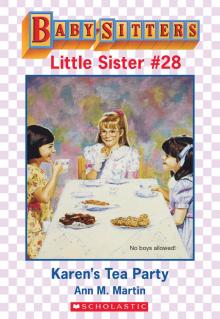 Karen's Tea Party
Karen's Tea Party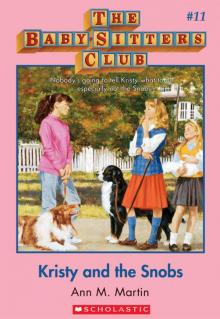 Kristy and the Snobs
Kristy and the Snobs Best Kept Secret
Best Kept Secret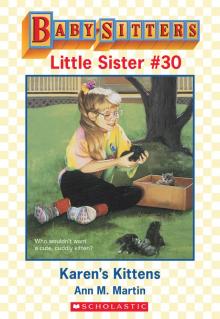 Karen's Kittens
Karen's Kittens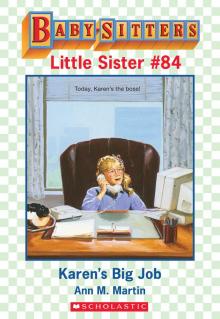 Karen's Big Job
Karen's Big Job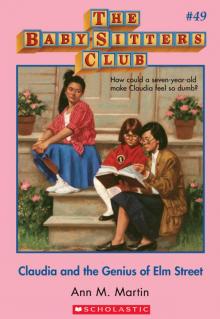 Claudia and the Genius of Elm Street
Claudia and the Genius of Elm Street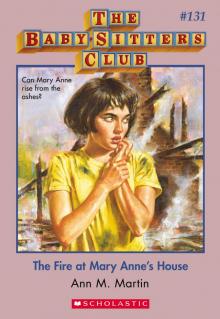 The Fire at Mary Anne's House
The Fire at Mary Anne's House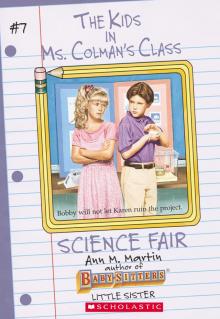 Science Fair
Science Fair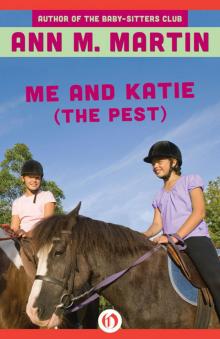 Me and Katie (The Pest)
Me and Katie (The Pest)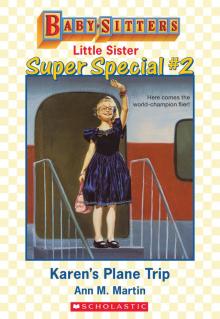 Karen's Plane Trip
Karen's Plane Trip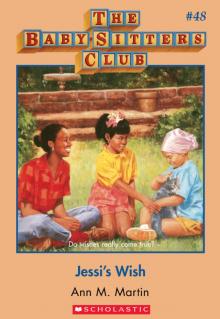 Jessi's Wish
Jessi's Wish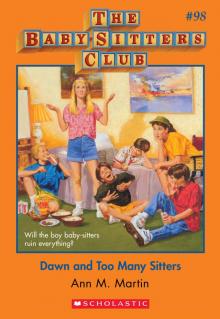 Dawn and Too Many Sitters
Dawn and Too Many Sitters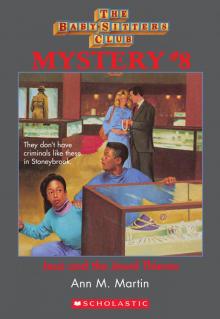 Jessi and the Jewel Thieves
Jessi and the Jewel Thieves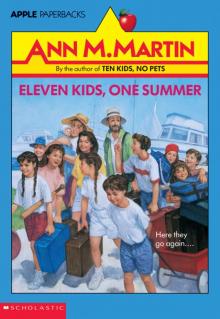 Eleven Kids, One Summer
Eleven Kids, One Summer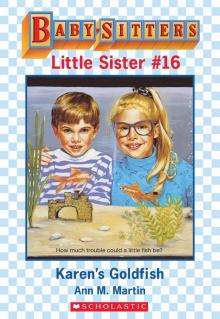 Karen's Goldfish
Karen's Goldfish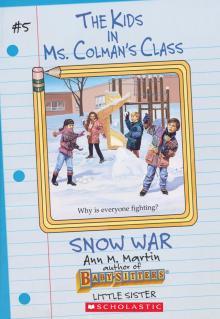 Snow War
Snow War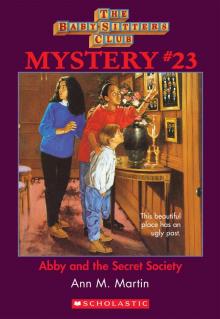 Abby and the Secret Society
Abby and the Secret Society Keeping Secrets
Keeping Secrets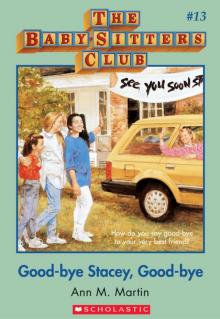 Good-Bye Stacey, Good-Bye
Good-Bye Stacey, Good-Bye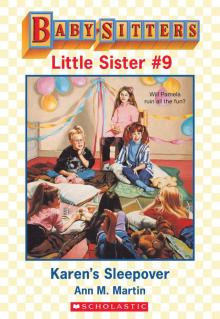 Karen's Sleepover
Karen's Sleepover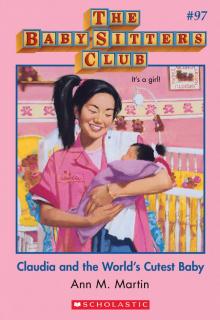 Claudia and the World's Cutest Baby
Claudia and the World's Cutest Baby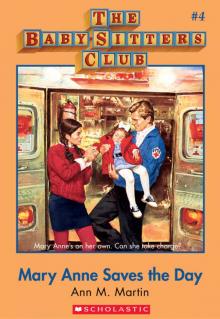 Mary Anne Saves the Day
Mary Anne Saves the Day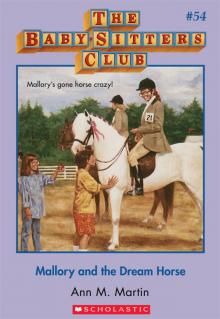 Mallory and the Dream Horse
Mallory and the Dream Horse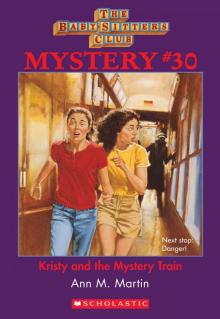 Kristy and the Mystery Train
Kristy and the Mystery Train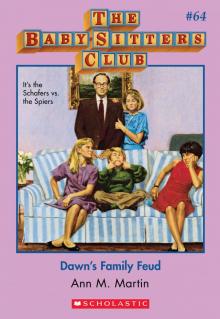 Dawn's Family Feud
Dawn's Family Feud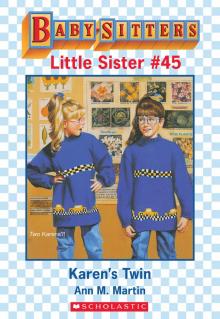 Karen's Twin
Karen's Twin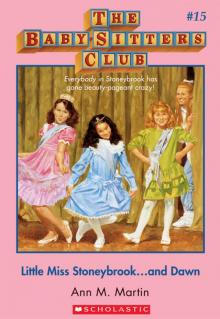 Little Miss Stoneybrook... And Dawn
Little Miss Stoneybrook... And Dawn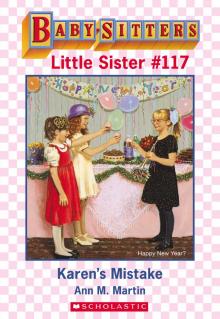 Karen's Mistake
Karen's Mistake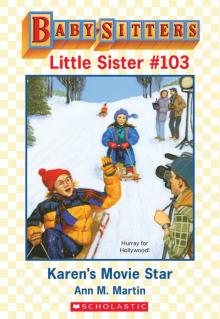 Karen's Movie Star
Karen's Movie Star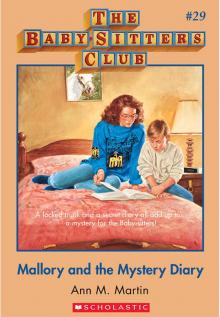 Mallory and the Mystery Diary
Mallory and the Mystery Diary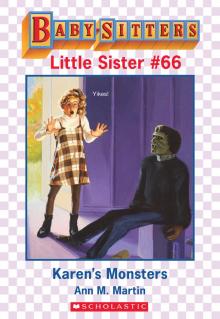 Karen's Monsters
Karen's Monsters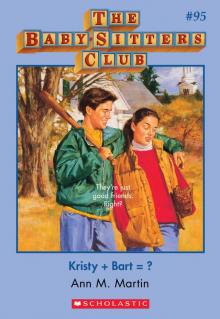 Kristy + Bart = ?
Kristy + Bart = ?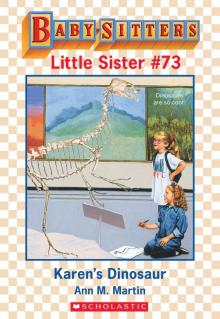 Karen's Dinosaur
Karen's Dinosaur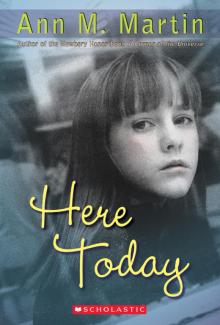 Here Today
Here Today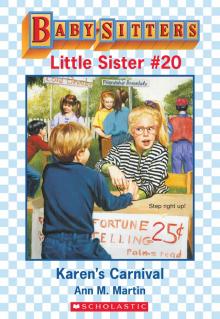 Karen's Carnival
Karen's Carnival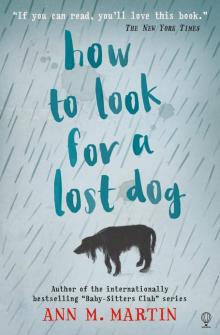 How to Look for a Lost Dog
How to Look for a Lost Dog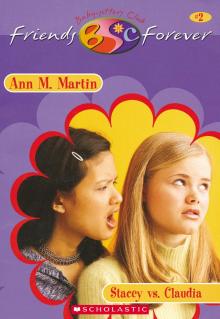 Stacey vs. Claudia
Stacey vs. Claudia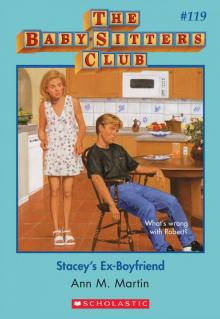 Stacey's Ex-Boyfriend
Stacey's Ex-Boyfriend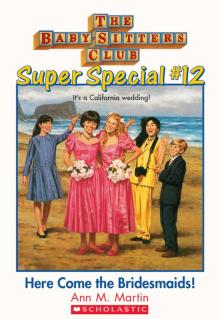 Here Come the Bridesmaids!
Here Come the Bridesmaids! Graduation Day
Graduation Day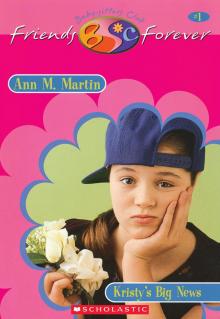 Kristy's Big News
Kristy's Big News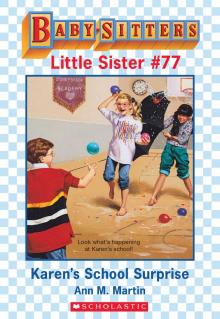 Karen's School Surprise
Karen's School Surprise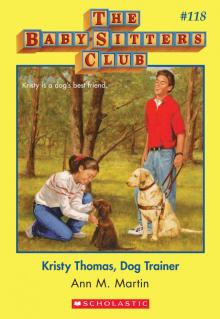 Kristy Thomas, Dog Trainer
Kristy Thomas, Dog Trainer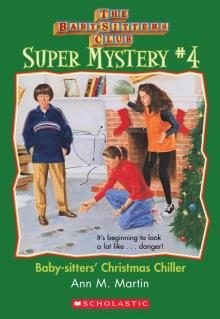 Baby-Sitters' Christmas Chiller
Baby-Sitters' Christmas Chiller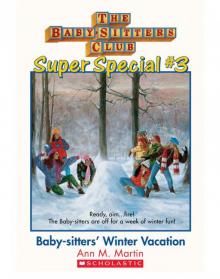 Baby-Sitters' Winter Vacation
Baby-Sitters' Winter Vacation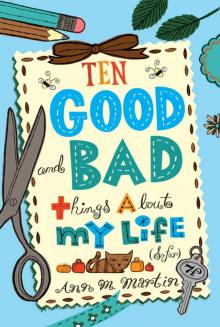 Ten Good and Bad Things About My Life
Ten Good and Bad Things About My Life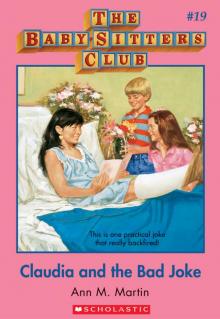 Claudia and the Bad Joke
Claudia and the Bad Joke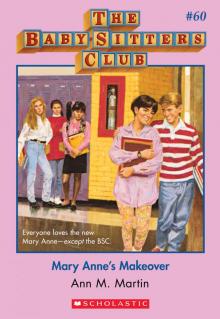 Mary Anne's Makeover
Mary Anne's Makeover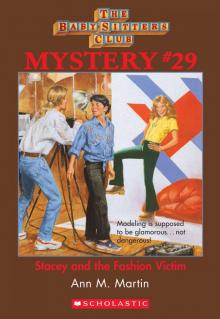 Stacey and the Fashion Victim
Stacey and the Fashion Victim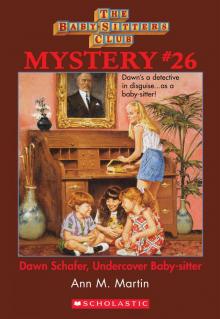 Dawn Schafer, Undercover Baby-Sitter
Dawn Schafer, Undercover Baby-Sitter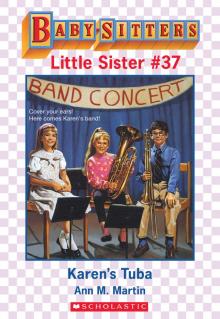 Karen's Tuba
Karen's Tuba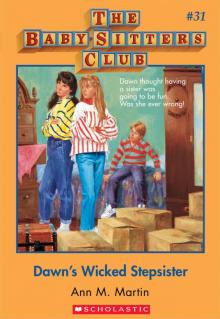 Dawn's Wicked Stepsister
Dawn's Wicked Stepsister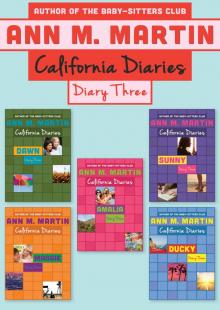 Diary Three: Dawn, Sunny, Maggie, Amalia, and Ducky
Diary Three: Dawn, Sunny, Maggie, Amalia, and Ducky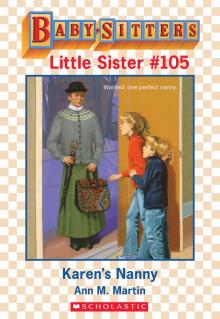 Karen's Nanny
Karen's Nanny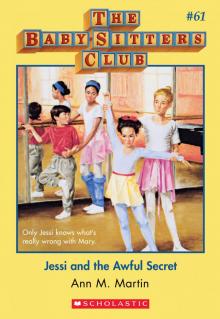 Jessi and the Awful Secret
Jessi and the Awful Secret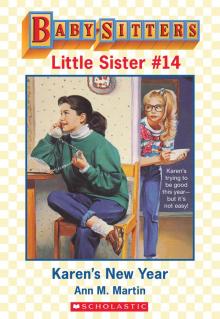 Karen's New Year
Karen's New Year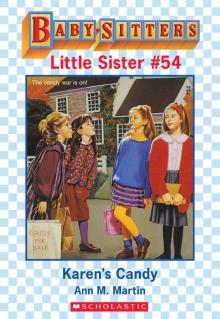 Karen's Candy
Karen's Candy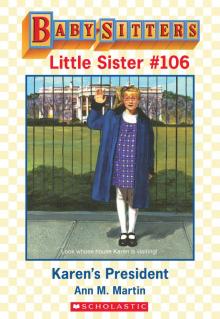 Karen's President
Karen's President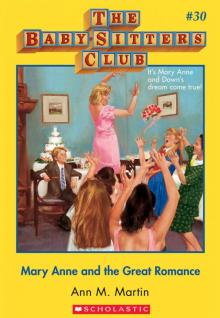 Mary Anne and the Great Romance
Mary Anne and the Great Romance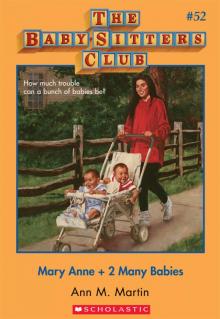 Mary Anne + 2 Many Babies
Mary Anne + 2 Many Babies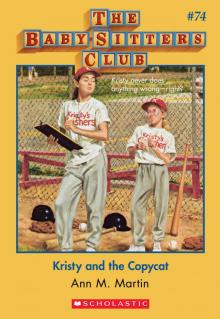 Kristy and the Copycat
Kristy and the Copycat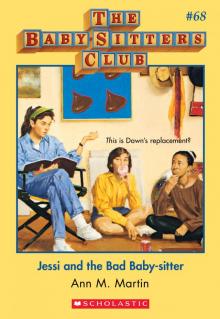 Jessi and the Bad Baby-Sitter
Jessi and the Bad Baby-Sitter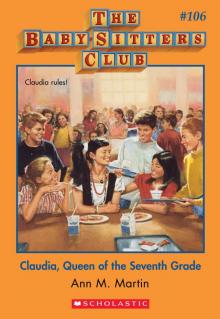 Claudia, Queen of the Seventh Grade
Claudia, Queen of the Seventh Grade Claudia and the Lighthouse Ghost
Claudia and the Lighthouse Ghost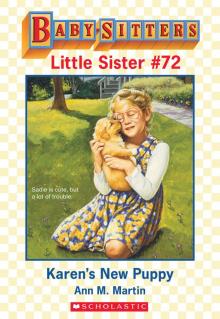 Karen's New Puppy
Karen's New Puppy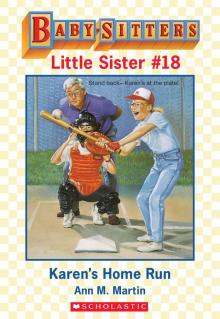 Karen's Home Run
Karen's Home Run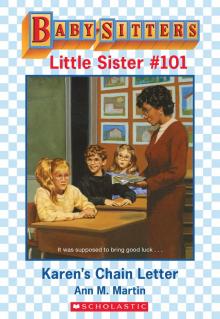 Karen's Chain Letter
Karen's Chain Letter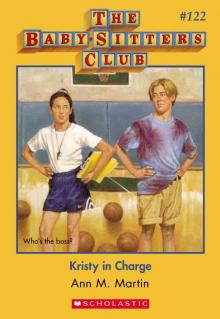 Kristy in Charge
Kristy in Charge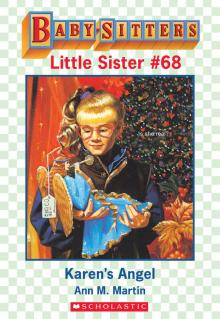 Karen's Angel
Karen's Angel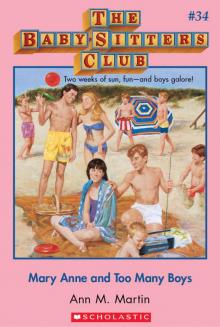 Mary Anne and Too Many Boys
Mary Anne and Too Many Boys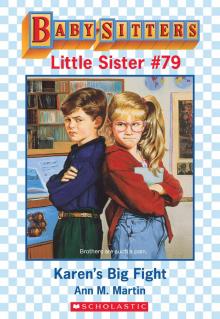 Karen's Big Fight
Karen's Big Fight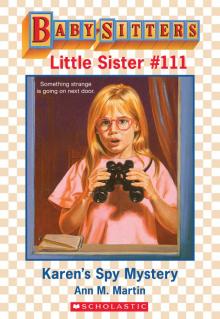 Karen's Spy Mystery
Karen's Spy Mystery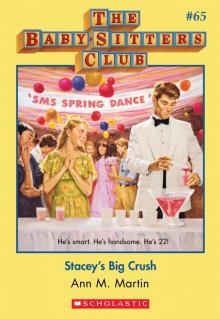 Stacey's Big Crush
Stacey's Big Crush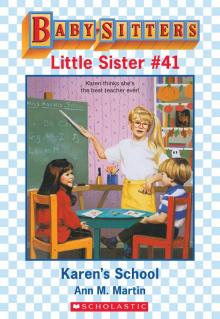 Karen's School
Karen's School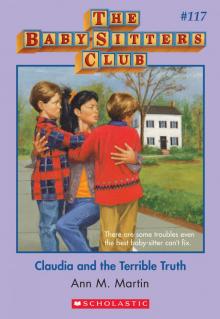 Claudia and the Terrible Truth
Claudia and the Terrible Truth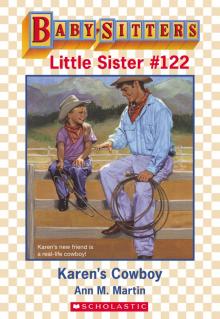 Karen's Cowboy
Karen's Cowboy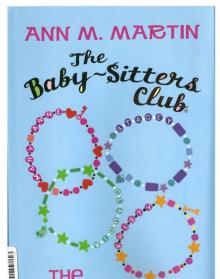 The Summer Before
The Summer Before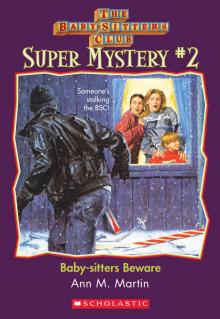 Beware, Dawn!
Beware, Dawn!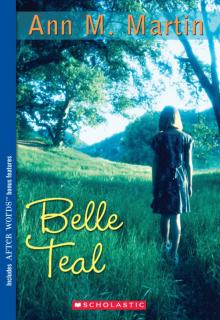 Belle Teale
Belle Teale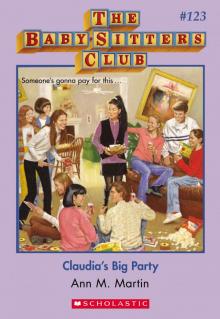 Claudia's Big Party
Claudia's Big Party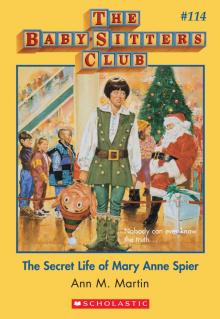 The Secret Life of Mary Anne Spier
The Secret Life of Mary Anne Spier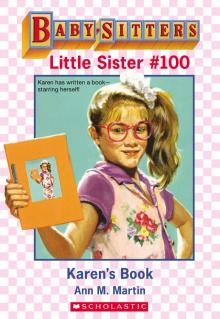 Karen's Book
Karen's Book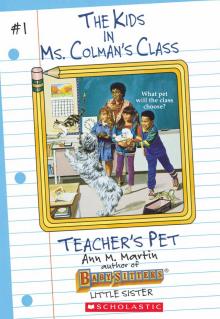 Teacher's Pet
Teacher's Pet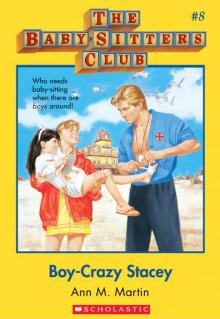 Boy-Crazy Stacey
Boy-Crazy Stacey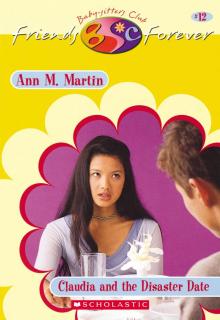 Claudia and the Disaster Date
Claudia and the Disaster Date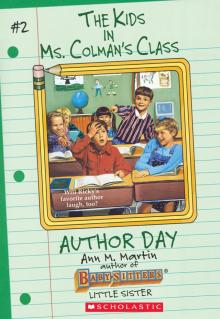 Author Day
Author Day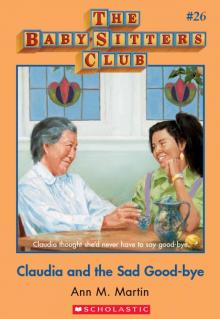 Claudia and the Sad Good-Bye
Claudia and the Sad Good-Bye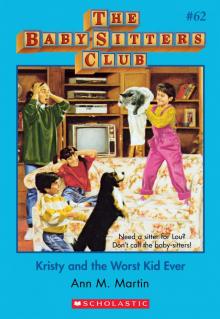 Kristy and the Worst Kid Ever
Kristy and the Worst Kid Ever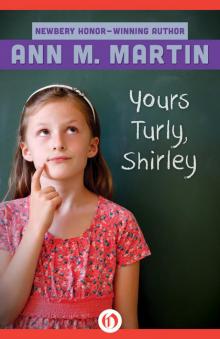 Yours Turly, Shirley
Yours Turly, Shirley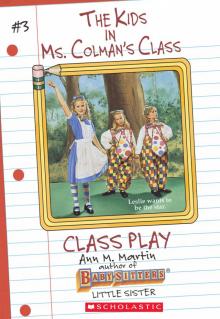 Class Play
Class Play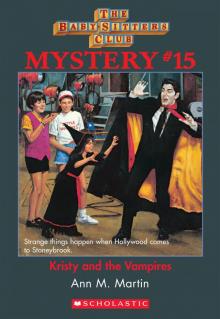 Kristy and the Vampires
Kristy and the Vampires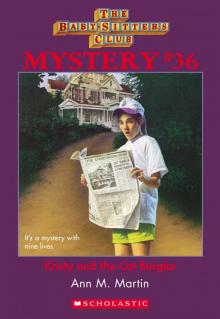 Kristy and the Cat Burglar
Kristy and the Cat Burglar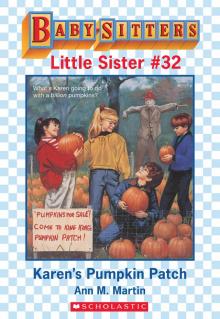 Karen's Pumpkin Patch
Karen's Pumpkin Patch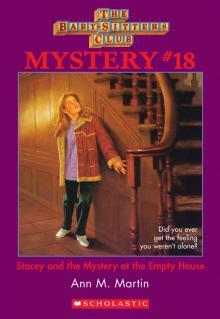 Stacey and the Mystery at the Empty House
Stacey and the Mystery at the Empty House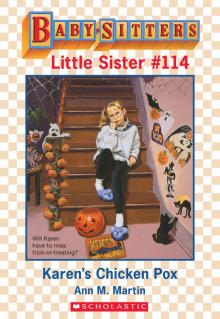 Karen's Chicken Pox
Karen's Chicken Pox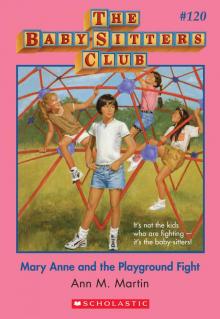 Mary Anne and the Playground Fight
Mary Anne and the Playground Fight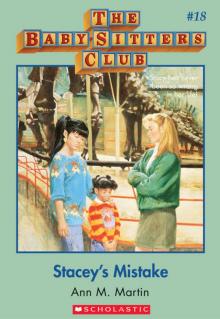 Stacey's Mistake
Stacey's Mistake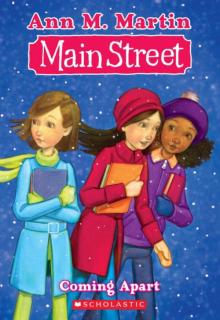 Coming Apart
Coming Apart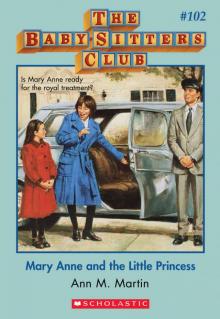 Mary Anne and the Little Princess
Mary Anne and the Little Princess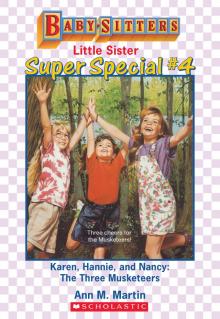 Karen, Hannie and Nancy: The Three Musketeers
Karen, Hannie and Nancy: The Three Musketeers 'Tis the Season
'Tis the Season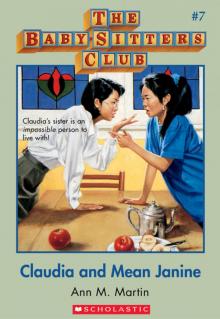 Claudia and Mean Janine
Claudia and Mean Janine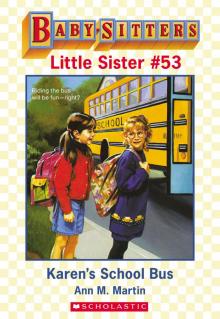 Karen's School Bus
Karen's School Bus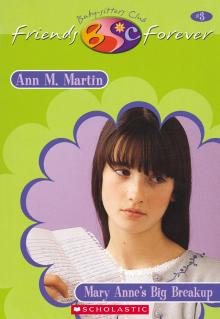 Mary Anne's Big Breakup
Mary Anne's Big Breakup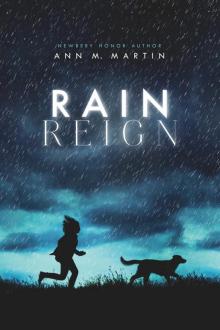 Rain Reign
Rain Reign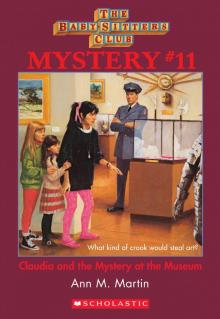 Claudia and the Mystery at the Museum
Claudia and the Mystery at the Museum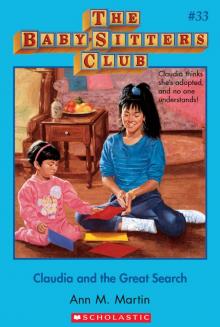 Claudia and the Great Search
Claudia and the Great Search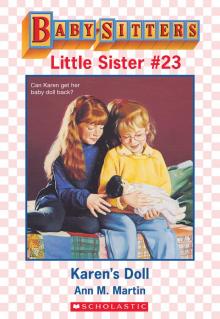 Karen's Doll
Karen's Doll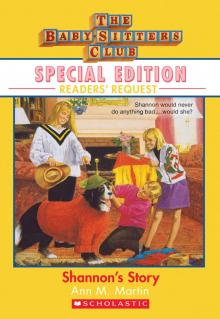 Shannon's Story
Shannon's Story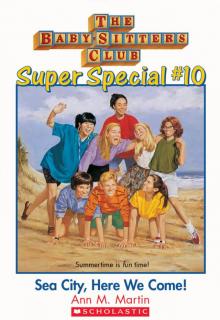 Sea City, Here We Come!
Sea City, Here We Come!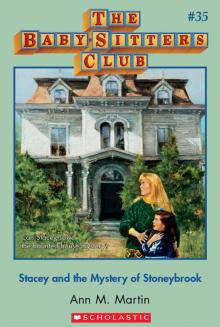 Stacey and the Mystery of Stoneybrook
Stacey and the Mystery of Stoneybrook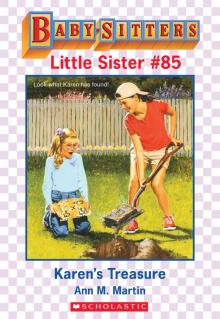 Karen's Treasure
Karen's Treasure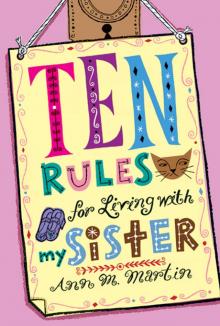 Ten Rules for Living With My Sister
Ten Rules for Living With My Sister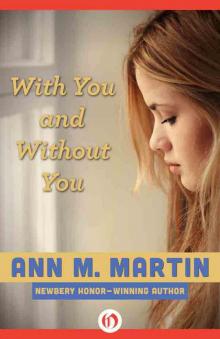 With You and Without You
With You and Without You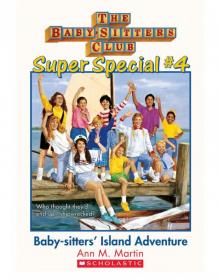 Baby-Sitters' Island Adventure
Baby-Sitters' Island Adventure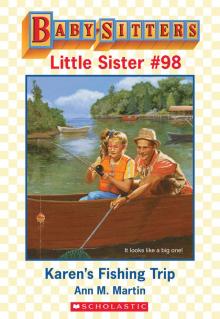 Karen's Fishing Trip
Karen's Fishing Trip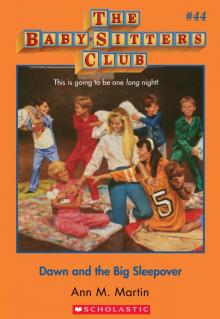 Dawn and the Big Sleepover
Dawn and the Big Sleepover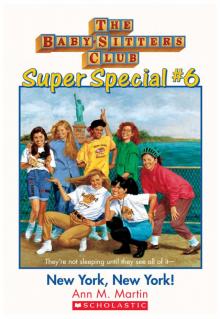 New York, New York!
New York, New York!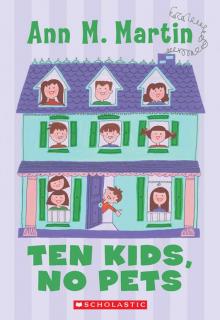 Ten Kids, No Pets
Ten Kids, No Pets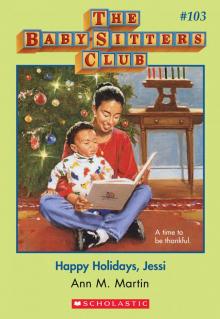 Happy Holidays, Jessi
Happy Holidays, Jessi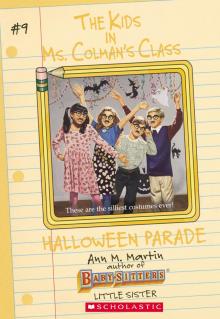 Halloween Parade
Halloween Parade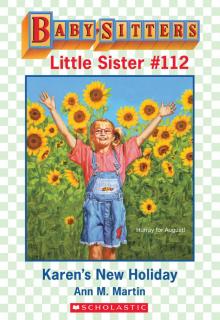 Karen's New Holiday
Karen's New Holiday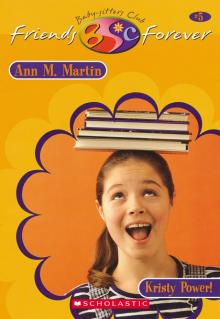 Kristy Power!
Kristy Power!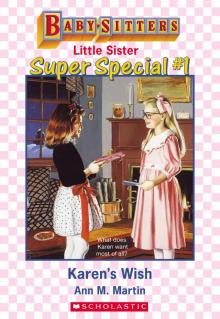 Karen's Wish
Karen's Wish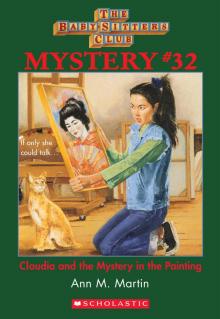 Claudia and the Mystery in the Painting
Claudia and the Mystery in the Painting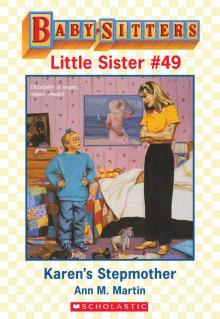 Karen's Stepmother
Karen's Stepmother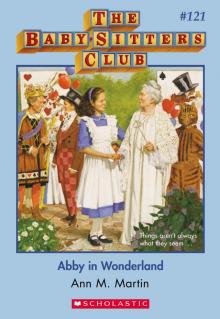 Abby in Wonderland
Abby in Wonderland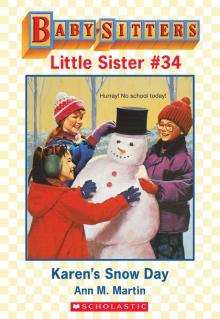 Karen's Snow Day
Karen's Snow Day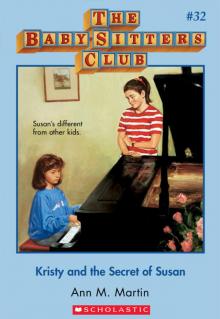 Kristy and the Secret of Susan
Kristy and the Secret of Susan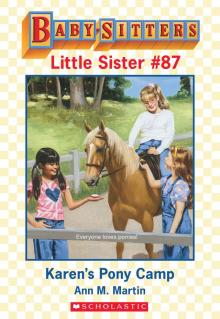 Karen's Pony Camp
Karen's Pony Camp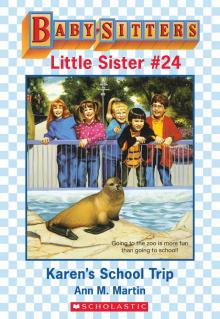 Karen's School Trip
Karen's School Trip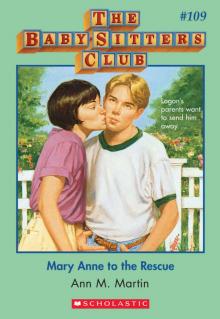 Mary Anne to the Rescue
Mary Anne to the Rescue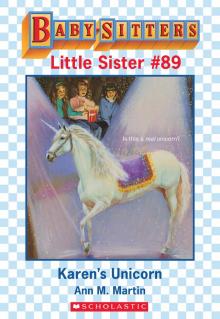 Karen's Unicorn
Karen's Unicorn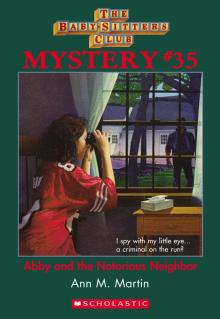 Abby and the Notorious Neighbor
Abby and the Notorious Neighbor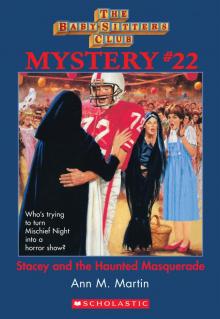 Stacey and the Haunted Masquerade
Stacey and the Haunted Masquerade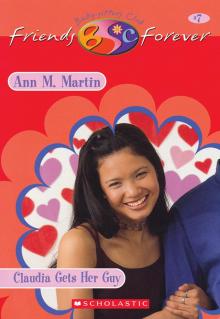 Claudia Gets Her Guy
Claudia Gets Her Guy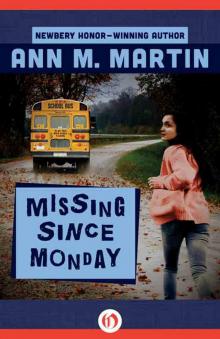 Missing Since Monday
Missing Since Monday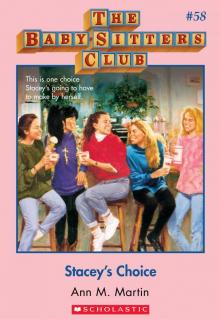 Stacey's Choice
Stacey's Choice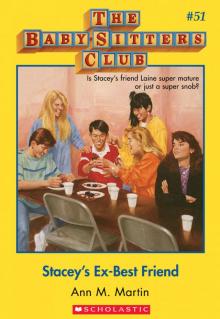 Stacey's Ex-Best Friend
Stacey's Ex-Best Friend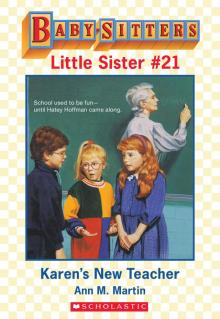 Karen's New Teacher
Karen's New Teacher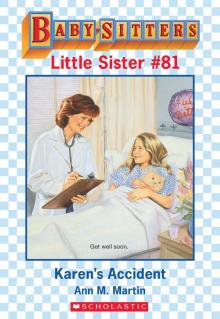 Karen's Accident
Karen's Accident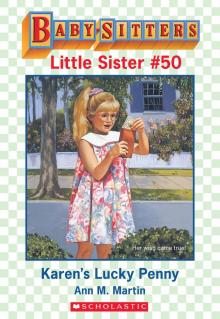 Karen's Lucky Penny
Karen's Lucky Penny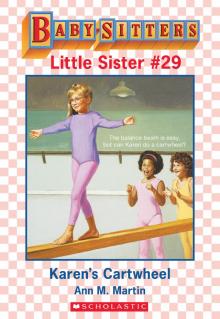 Karen's Cartwheel
Karen's Cartwheel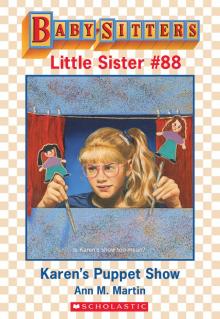 Karen's Puppet Show
Karen's Puppet Show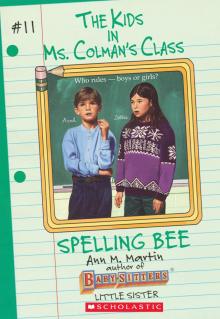 Spelling Bee
Spelling Bee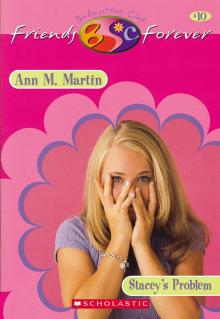 Stacey's Problem
Stacey's Problem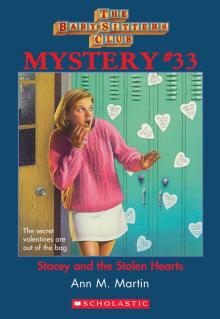 Stacey and the Stolen Hearts
Stacey and the Stolen Hearts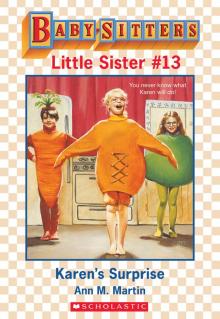 Karen's Surprise
Karen's Surprise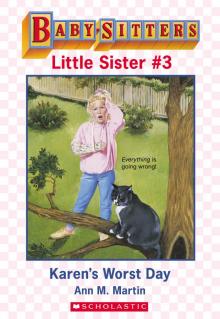 Karen's Worst Day
Karen's Worst Day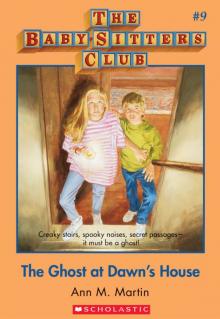 The Ghost at Dawn's House
The Ghost at Dawn's House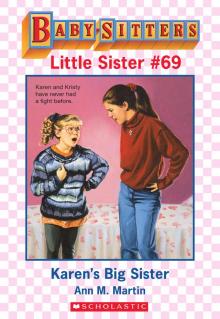 Karen's Big Sister
Karen's Big Sister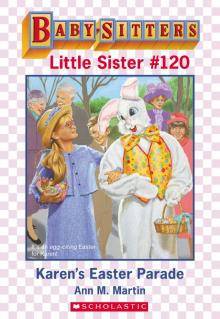 Karen's Easter Parade
Karen's Easter Parade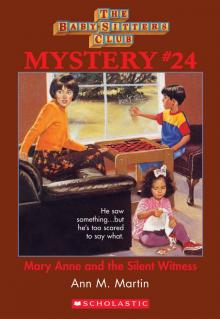 Mary Anne and the Silent Witness
Mary Anne and the Silent Witness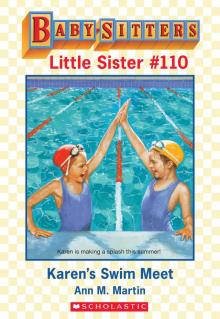 Karen's Swim Meet
Karen's Swim Meet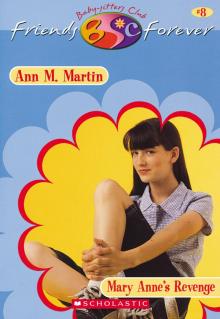 Mary Anne's Revenge
Mary Anne's Revenge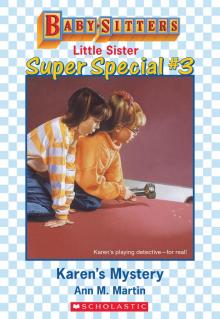 Karen's Mystery
Karen's Mystery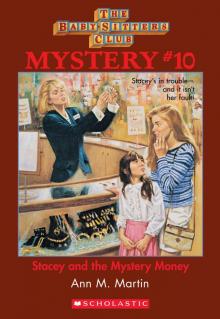 Stacey and the Mystery Money
Stacey and the Mystery Money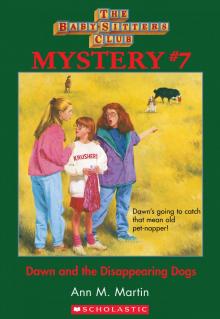 Dawn and the Disappearing Dogs
Dawn and the Disappearing Dogs Karen's Christmas Tree
Karen's Christmas Tree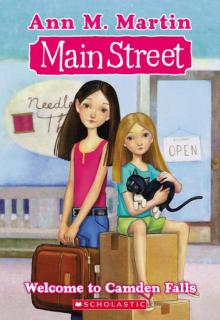 Welcome to Camden Falls
Welcome to Camden Falls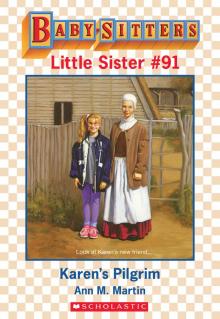 Karen's Pilgrim
Karen's Pilgrim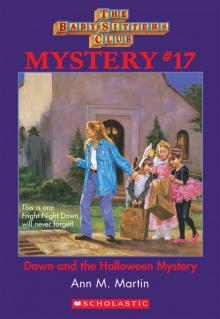 Dawn and the Halloween Mystery
Dawn and the Halloween Mystery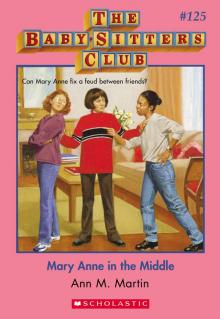 Mary Anne in the Middle
Mary Anne in the Middle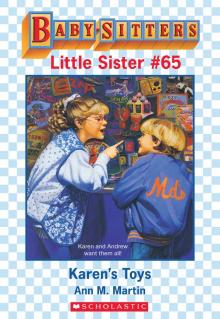 Karen's Toys
Karen's Toys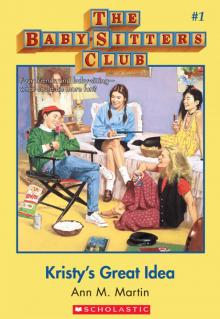 Kristy's Great Idea
Kristy's Great Idea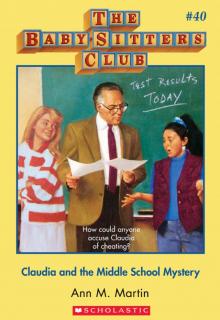 Claudia and the Middle School Mystery
Claudia and the Middle School Mystery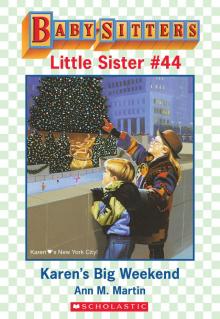 Karen's Big Weekend
Karen's Big Weekend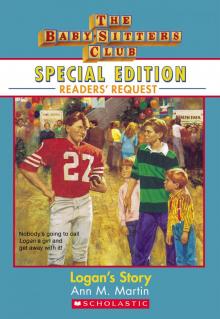 Logan's Story
Logan's Story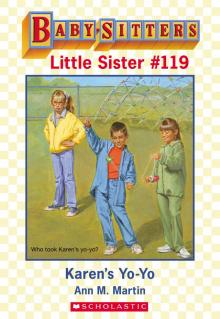 Karen's Yo-Yo
Karen's Yo-Yo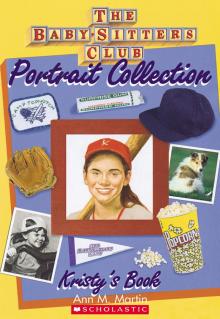 Kristy's Book
Kristy's Book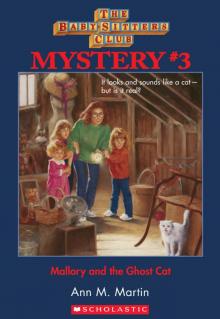 Mallory and the Ghost Cat
Mallory and the Ghost Cat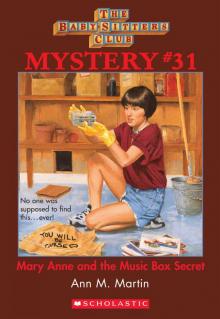 Mary Anne and the Music
Mary Anne and the Music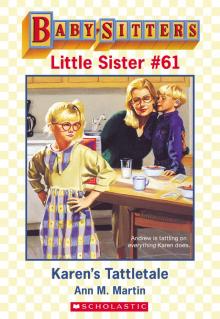 Karen's Tattletale
Karen's Tattletale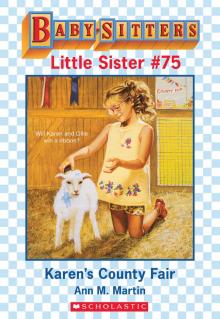 Karen's County Fair
Karen's County Fair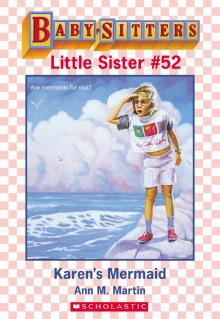 Karen's Mermaid
Karen's Mermaid Snowbound
Snowbound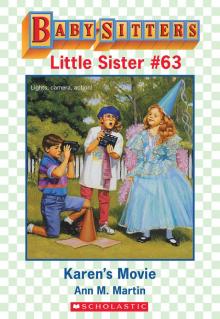 Karen's Movie
Karen's Movie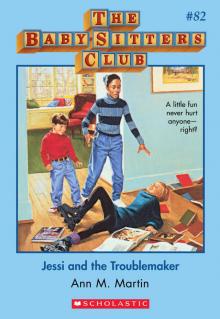 Jessi and the Troublemaker
Jessi and the Troublemaker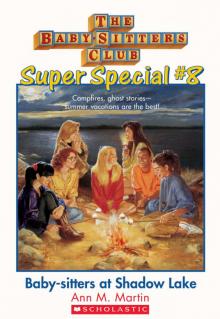 Baby-Sitters at Shadow Lake
Baby-Sitters at Shadow Lake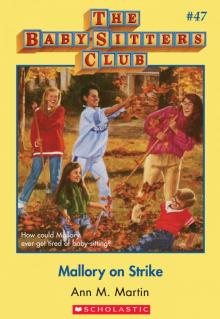 Mallory on Strike
Mallory on Strike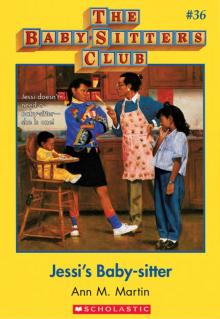 Jessi's Baby-Sitter
Jessi's Baby-Sitter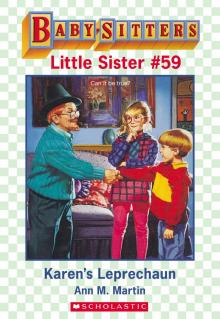 Karen's Leprechaun
Karen's Leprechaun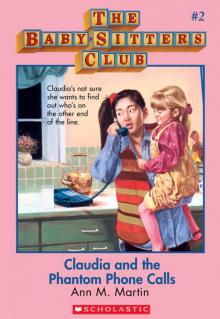 Claudia and the Phantom Phone Calls
Claudia and the Phantom Phone Calls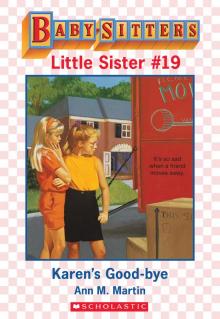 Karen's Good-Bye
Karen's Good-Bye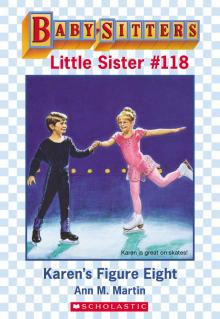 Karen's Figure Eight
Karen's Figure Eight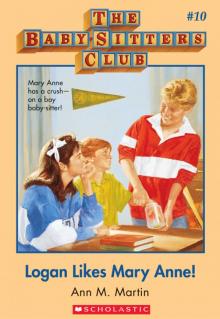 Logan Likes Mary Anne!
Logan Likes Mary Anne!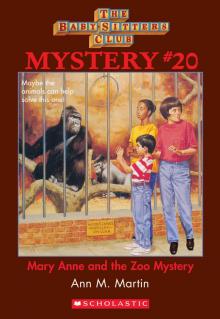 Mary Anne and the Zoo Mystery
Mary Anne and the Zoo Mystery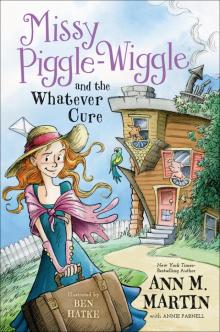 Missy Piggle-Wiggle and the Whatever Cure
Missy Piggle-Wiggle and the Whatever Cure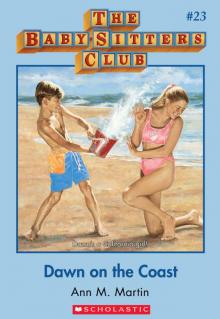 Dawn on the Coast
Dawn on the Coast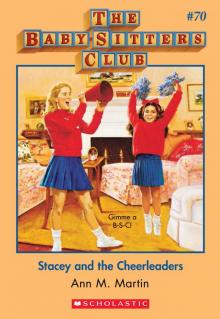 Stacey and the Cheerleaders
Stacey and the Cheerleaders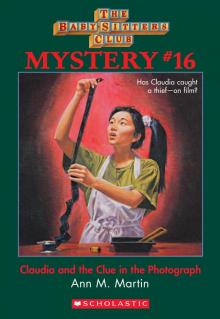 Claudia and the Clue in the Photograph
Claudia and the Clue in the Photograph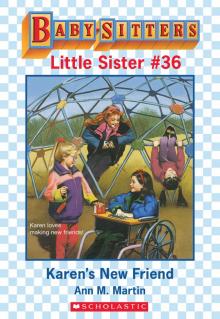 Karen's New Friend
Karen's New Friend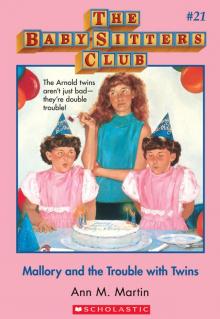 Mallory and the Trouble With Twins
Mallory and the Trouble With Twins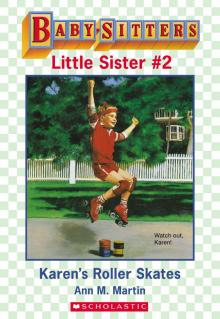 Karen's Roller Skates
Karen's Roller Skates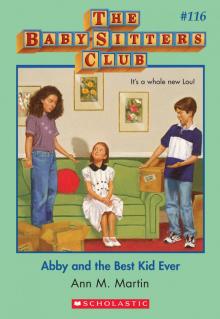 Abby and the Best Kid Ever
Abby and the Best Kid Ever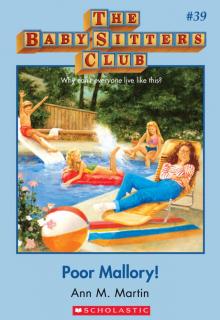 Poor Mallory!
Poor Mallory!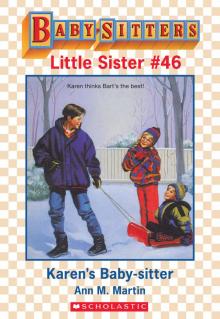 Karen's Witch
Karen's Witch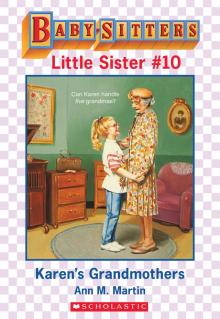 Karen's Grandmothers
Karen's Grandmothers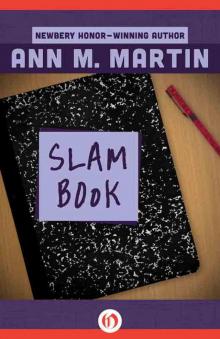 Slam Book
Slam Book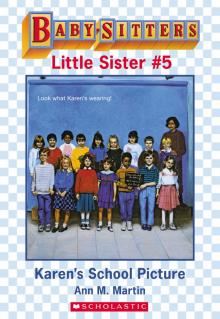 Karen's School Picture
Karen's School Picture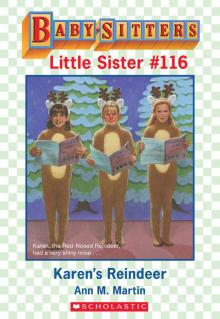 Karen's Reindeer
Karen's Reindeer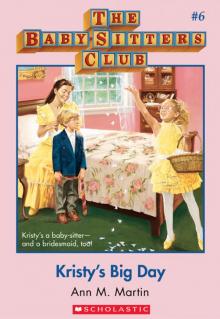 Kristy's Big Day
Kristy's Big Day The Long Way Home
The Long Way Home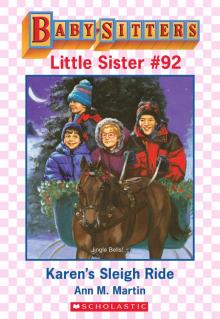 Karen's Sleigh Ride
Karen's Sleigh Ride On Christmas Eve
On Christmas Eve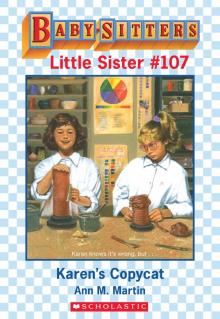 Karen's Copycat
Karen's Copycat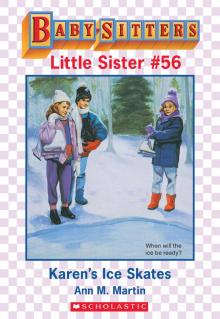 Karen's Ice Skates
Karen's Ice Skates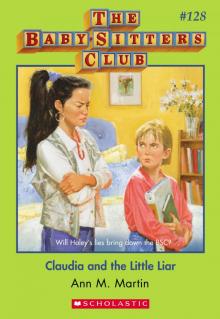 Claudia and the Little Liar
Claudia and the Little Liar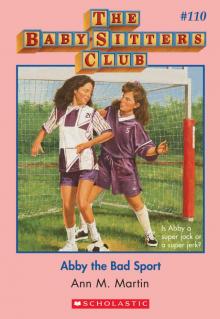 Abby the Bad Sport
Abby the Bad Sport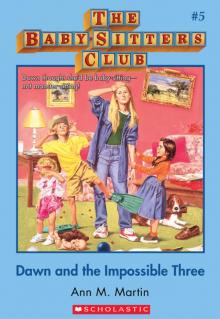 The Baby-Sitters Club #5: Dawn and the Impossible Three
The Baby-Sitters Club #5: Dawn and the Impossible Three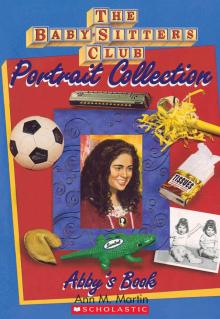 Abby's Book
Abby's Book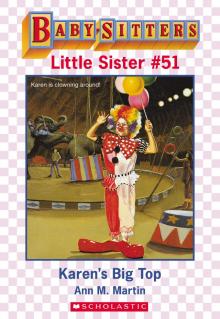 Karen's Big Top
Karen's Big Top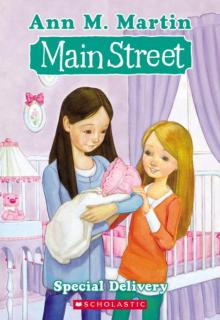 Main Street #8: Special Delivery
Main Street #8: Special Delivery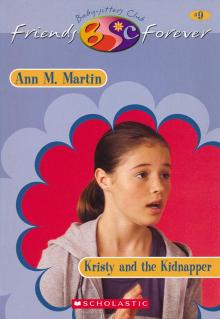 Kristy and the Kidnapper
Kristy and the Kidnapper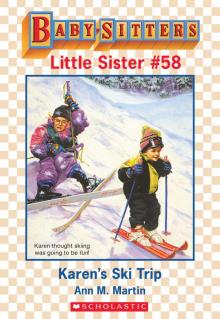 Karen's Ski Trip
Karen's Ski Trip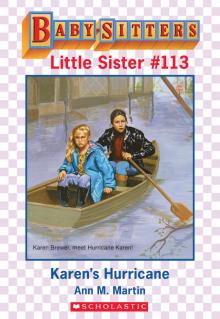 Karen's Hurricane
Karen's Hurricane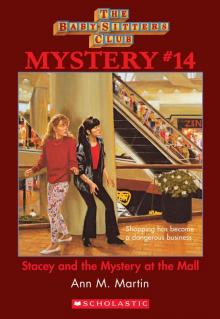 Stacey and the Mystery at the Mall
Stacey and the Mystery at the Mall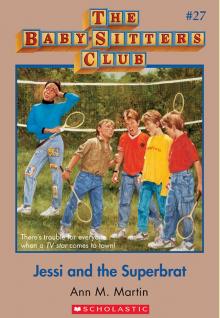 Jessi and the Superbrat
Jessi and the Superbrat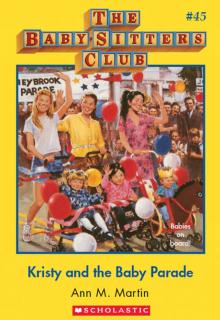 Kristy and the Baby Parade
Kristy and the Baby Parade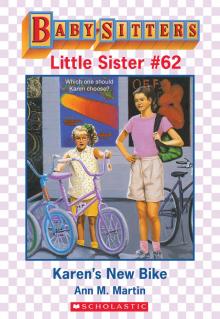 Karen's New Bike
Karen's New Bike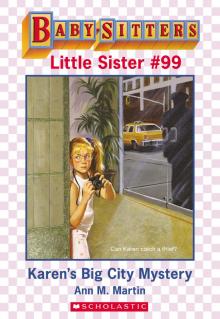 Karen's Big City Mystery
Karen's Big City Mystery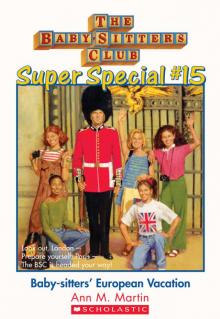 Baby-Sitters' European Vacation
Baby-Sitters' European Vacation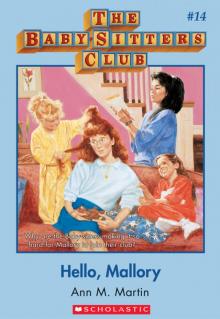 Hello, Mallory
Hello, Mallory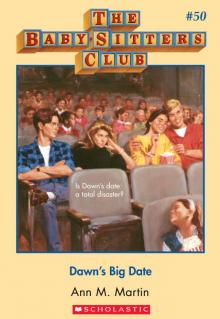 Dawn's Big Date
Dawn's Big Date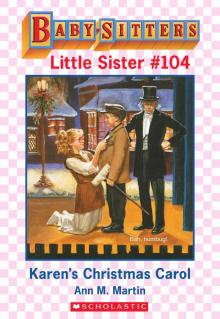 Karen's Christmas Carol
Karen's Christmas Carol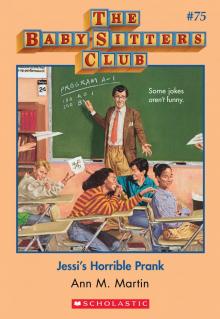 Jessi's Horrible Prank
Jessi's Horrible Prank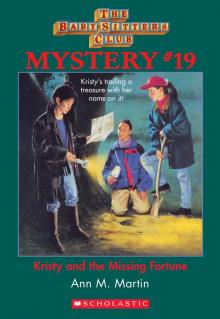 Kristy and the Missing Fortune
Kristy and the Missing Fortune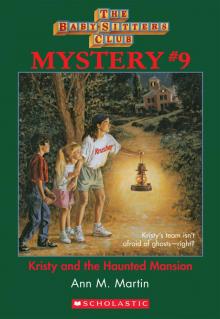 Kristy and the Haunted Mansion
Kristy and the Haunted Mansion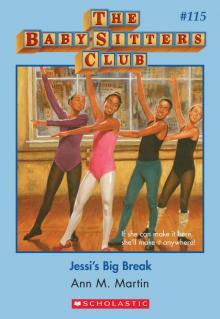 Jessi's Big Break
Jessi's Big Break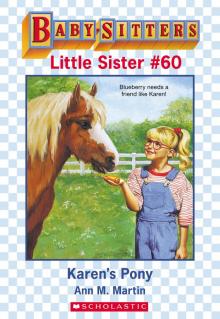 Karen's Pony
Karen's Pony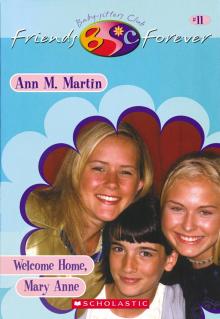 Welcome Home, Mary Anne
Welcome Home, Mary Anne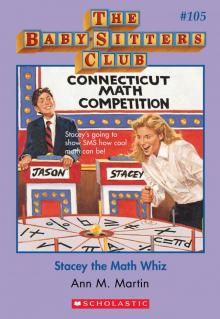 Stacey the Math Whiz
Stacey the Math Whiz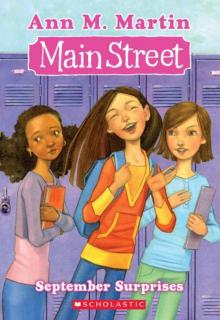 September Surprises
September Surprises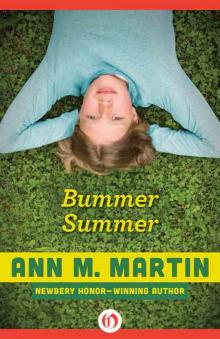 Bummer Summer
Bummer Summer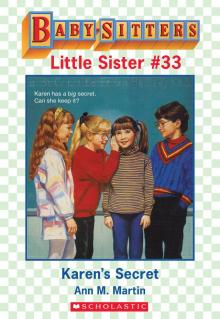 Karen's Secret
Karen's Secret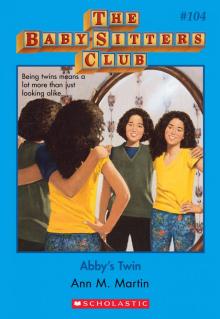 Abby's Twin
Abby's Twin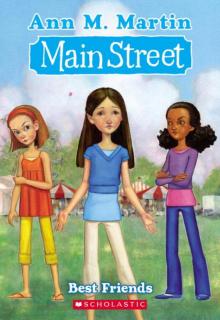 Main Street #4: Best Friends
Main Street #4: Best Friends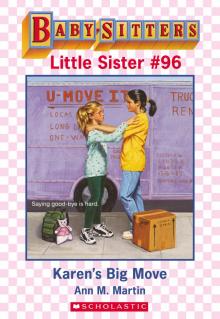 Karen's Big Move
Karen's Big Move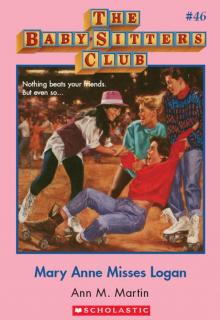 Mary Anne Misses Logan
Mary Anne Misses Logan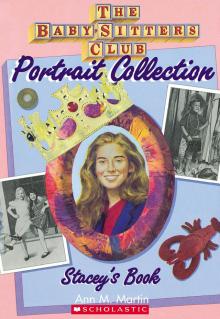 Stacey's Book
Stacey's Book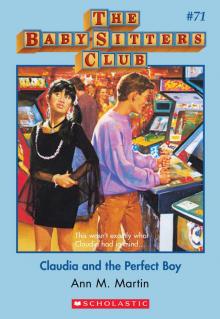 Claudia and the Perfect Boy
Claudia and the Perfect Boy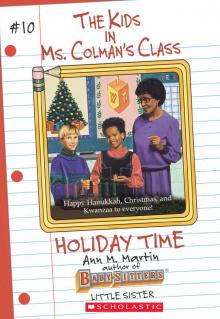 Holiday Time
Holiday Time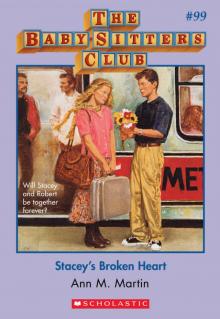 Stacey's Broken Heart
Stacey's Broken Heart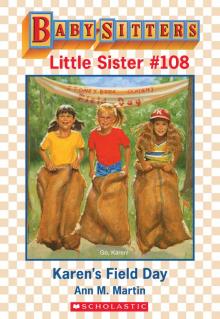 Karen's Field Day
Karen's Field Day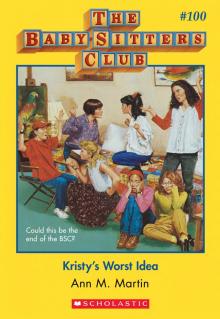 Kristy's Worst Idea
Kristy's Worst Idea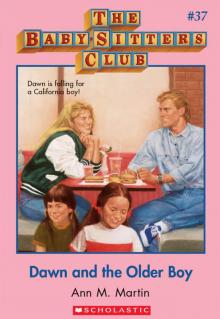 Dawn and the Older Boy
Dawn and the Older Boy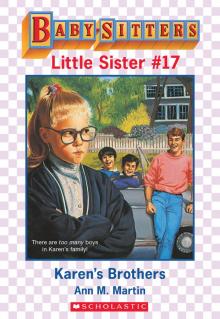 Karen's Brothers
Karen's Brothers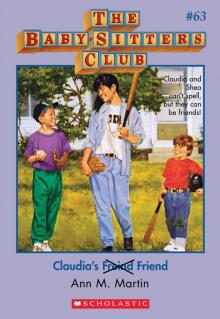 Claudia's Friend
Claudia's Friend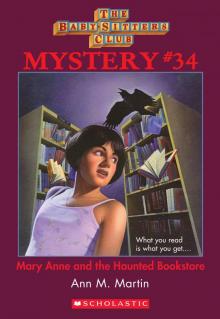 Mary Anne and the Haunted Bookstore
Mary Anne and the Haunted Bookstore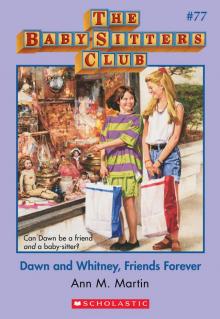 Dawn and Whitney, Friends Forever
Dawn and Whitney, Friends Forever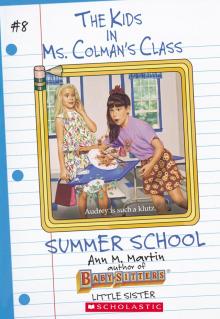 Summer School
Summer School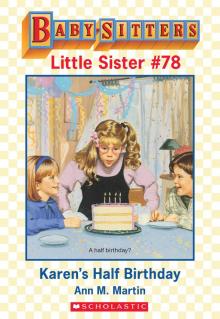 Karen's Birthday
Karen's Birthday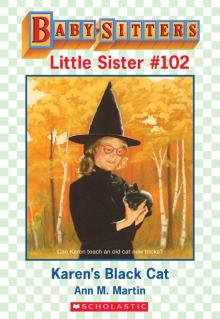 Karen's Black Cat
Karen's Black Cat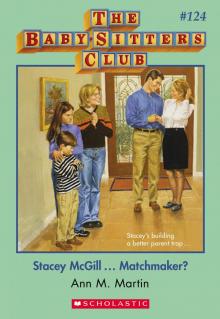 Stacey McGill... Matchmaker?
Stacey McGill... Matchmaker?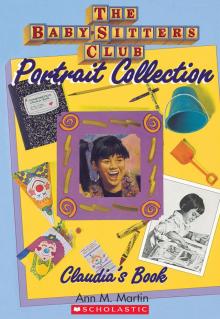 Claudia's Book
Claudia's Book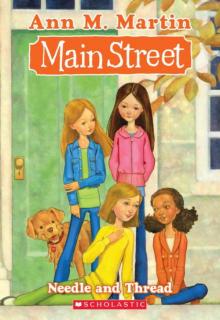 Main Street #2: Needle and Thread
Main Street #2: Needle and Thread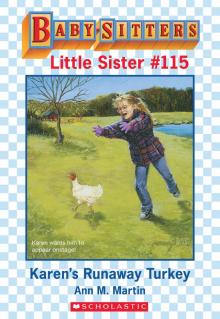 Karen's Runaway Turkey
Karen's Runaway Turkey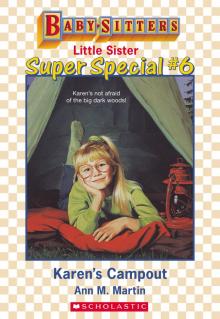 Karen's Campout
Karen's Campout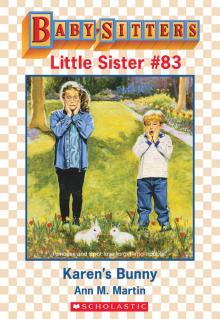 Karen's Bunny
Karen's Bunny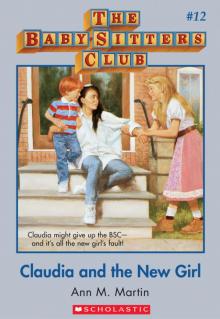 Claudia and the New Girl
Claudia and the New Girl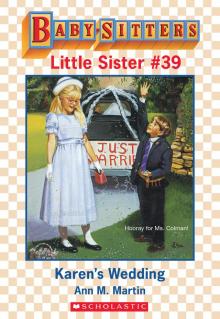 Karen's Wedding
Karen's Wedding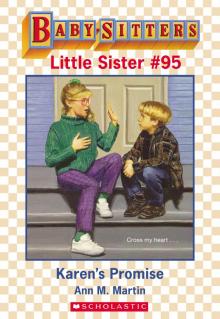 Karen's Promise
Karen's Promise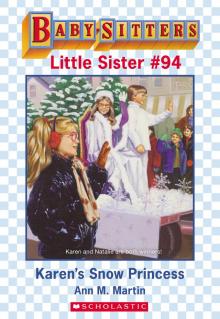 Karen's Snow Princess
Karen's Snow Princess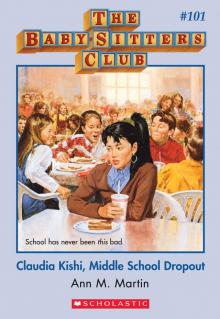 Claudia Kishi, Middle School Dropout
Claudia Kishi, Middle School Dropout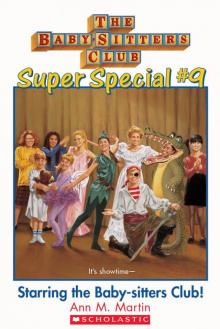 Starring the Baby-Sitters Club!
Starring the Baby-Sitters Club!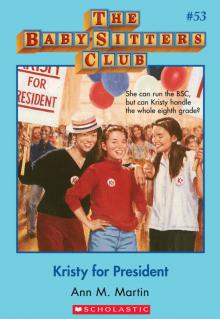 Kristy for President
Kristy for President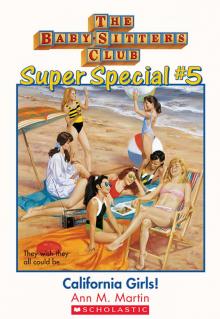 California Girls!
California Girls!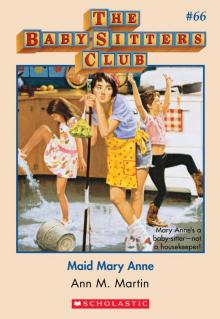 Maid Mary Anne
Maid Mary Anne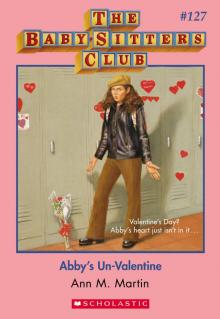 Abby's Un-Valentine
Abby's Un-Valentine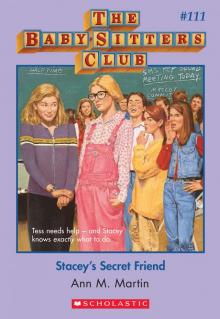 Stacey's Secret Friend
Stacey's Secret Friend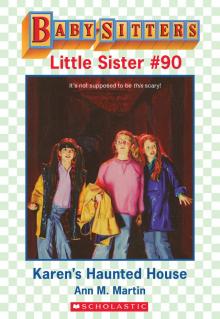 Karen's Haunted House
Karen's Haunted House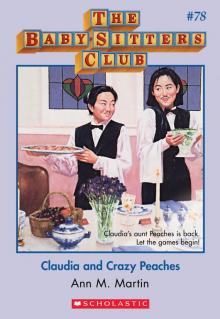 Claudia and Crazy Peaches
Claudia and Crazy Peaches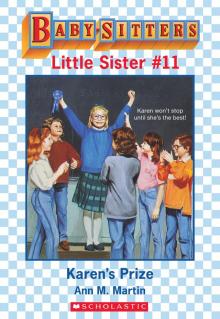 Karen's Prize
Karen's Prize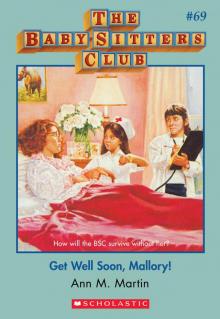 Get Well Soon, Mallory!
Get Well Soon, Mallory!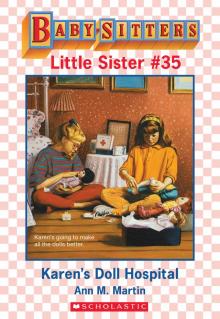 Karen's Doll Hospital
Karen's Doll Hospital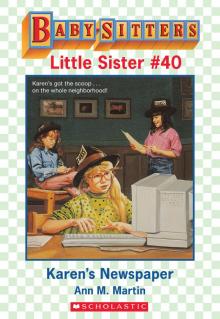 Karen's Newspaper
Karen's Newspaper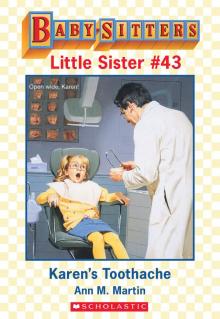 Karen's Toothache
Karen's Toothache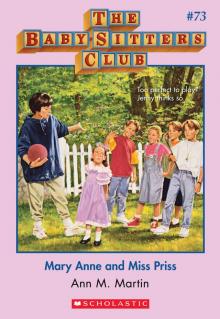 Mary Anne and Miss Priss
Mary Anne and Miss Priss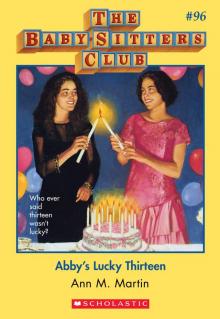 Abby's Lucky Thirteen
Abby's Lucky Thirteen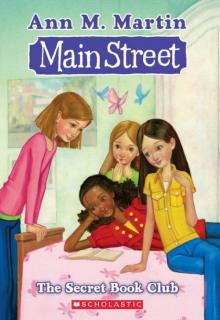 The Secret Book Club
The Secret Book Club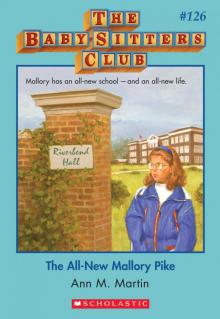 The All-New Mallory Pike
The All-New Mallory Pike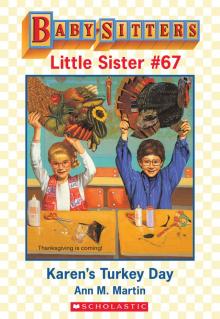 Karen's Turkey Day
Karen's Turkey Day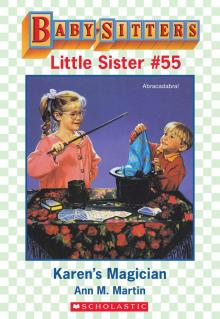 Karen's Magician
Karen's Magician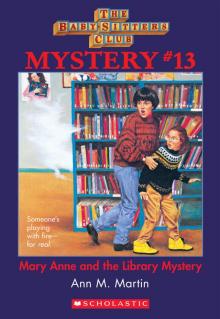 Mary Anne and the Library Mystery
Mary Anne and the Library Mystery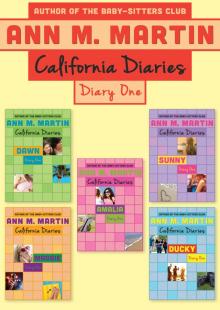 Diary One: Dawn, Sunny, Maggie, Amalia, and Ducky
Diary One: Dawn, Sunny, Maggie, Amalia, and Ducky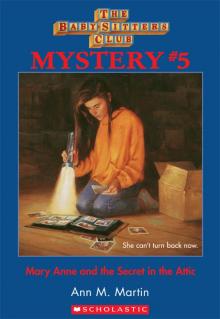 Mary Anne and the Secret in the Attic
Mary Anne and the Secret in the Attic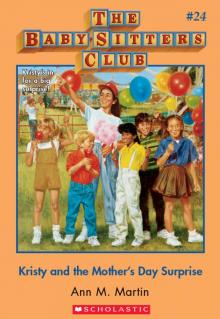 Kristy and the Mother's Day Surprise
Kristy and the Mother's Day Surprise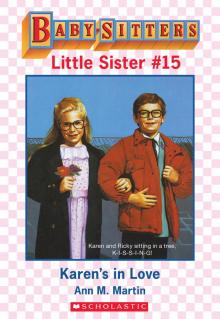 Karen's in Love
Karen's in Love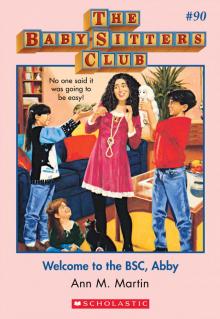 Welcome to the BSC, Abby
Welcome to the BSC, Abby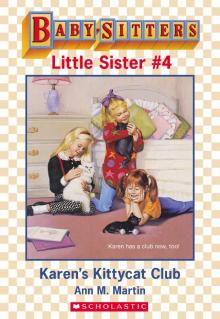 Karen's Kittycat Club
Karen's Kittycat Club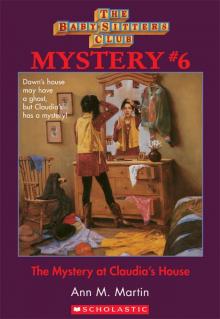 The Mystery at Claudia's House
The Mystery at Claudia's House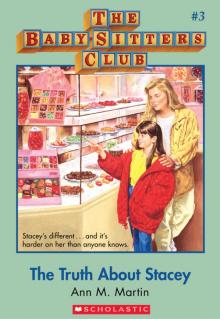 The Truth About Stacey
The Truth About Stacey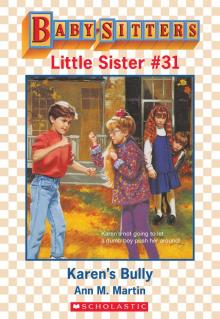 Karen's Bully
Karen's Bully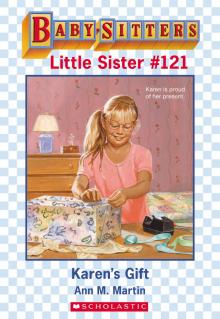 Karen's Gift
Karen's Gift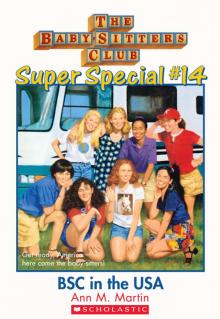 BSC in the USA
BSC in the USA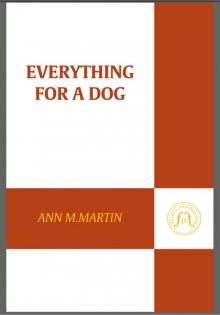 Everything for a Dog
Everything for a Dog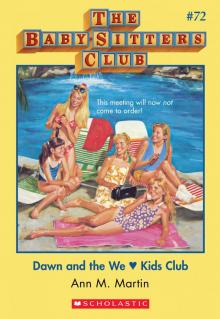 Dawn and the We Love Kids Club
Dawn and the We Love Kids Club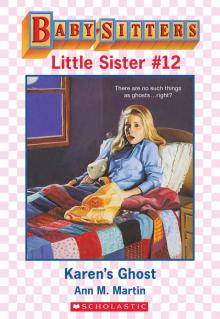 Karen's Ghost
Karen's Ghost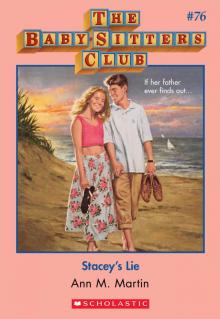 Stacey's Lie
Stacey's Lie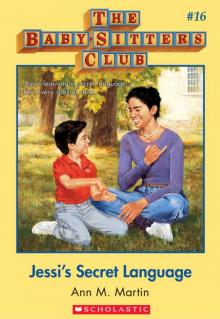 Jessi's Secret Language
Jessi's Secret Language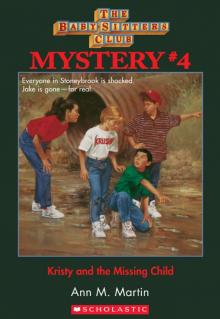 Kristy and the Missing Child
Kristy and the Missing Child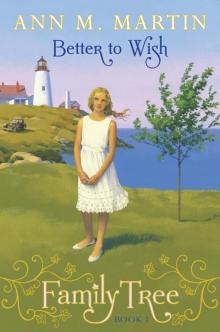 Better to Wish
Better to Wish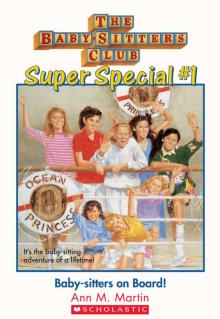 Baby-Sitters on Board!
Baby-Sitters on Board!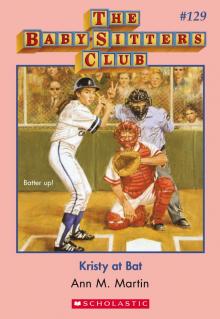 Kristy at Bat
Kristy at Bat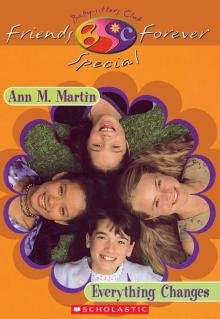 Everything Changes
Everything Changes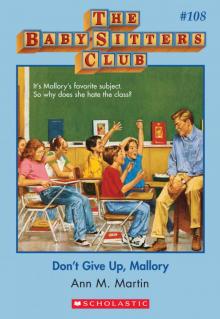 Don't Give Up, Mallory
Don't Give Up, Mallory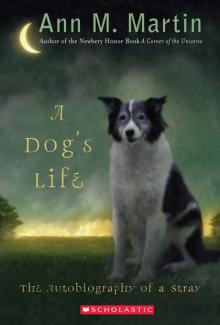 A Dog's Life: The Autobiography of a Stray
A Dog's Life: The Autobiography of a Stray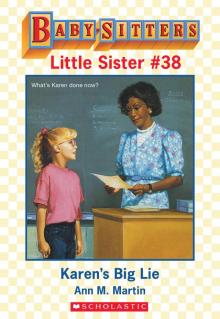 Karen's Big Lie
Karen's Big Lie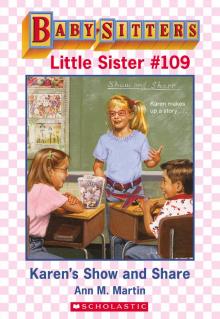 Karen's Show and Share
Karen's Show and Share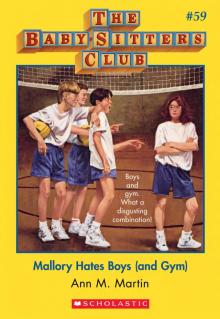 Mallory Hates Boys (and Gym)
Mallory Hates Boys (and Gym)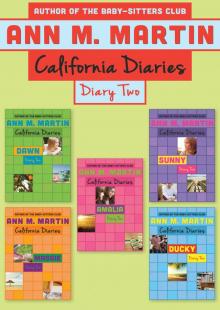 Diary Two: Dawn, Sunny, Maggie, Amalia, and Ducky
Diary Two: Dawn, Sunny, Maggie, Amalia, and Ducky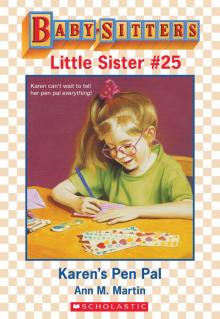 Karen's Pen Pal
Karen's Pen Pal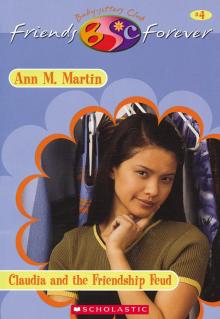 Claudia and the Friendship Feud
Claudia and the Friendship Feud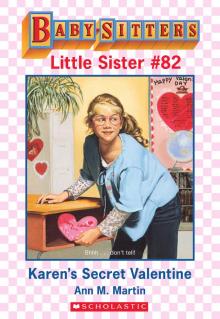 Karen's Secret Valentine
Karen's Secret Valentine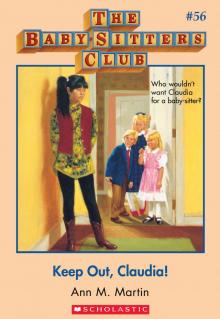 Keep Out, Claudia!
Keep Out, Claudia!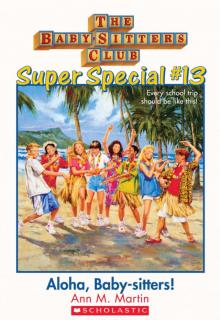 Aloha, Baby-Sitters!
Aloha, Baby-Sitters!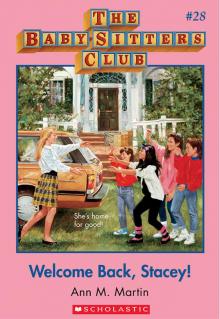 Welcome Back, Stacey
Welcome Back, Stacey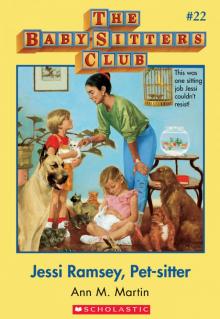 Jessi Ramsey, Pet-Sitter
Jessi Ramsey, Pet-Sitter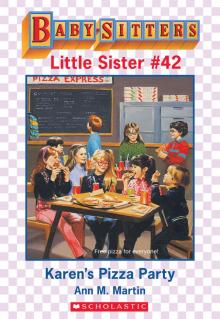 Karen's Pizza Party
Karen's Pizza Party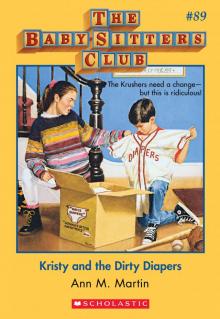 Kristy and the Dirty Diapers
Kristy and the Dirty Diapers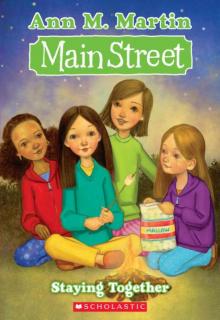 Staying Together
Staying Together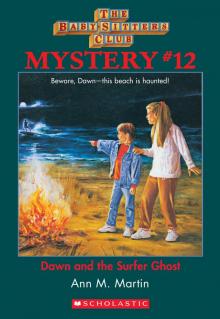 Dawn and the Surfer Ghost
Dawn and the Surfer Ghost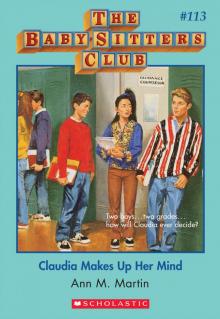 Claudia Makes Up Her Mind
Claudia Makes Up Her Mind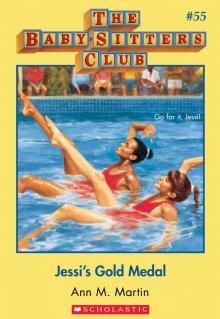 Jessi's Gold Medal
Jessi's Gold Medal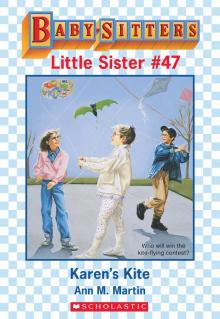 Karen's Kite
Karen's Kite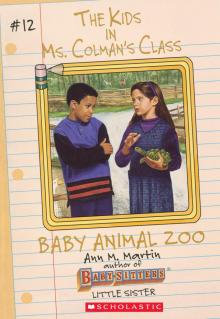 Baby Animal Zoo
Baby Animal Zoo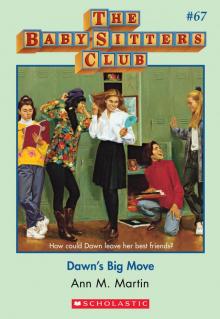 Dawn's Big Move
Dawn's Big Move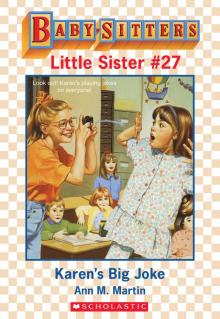 Karen's Big Joke
Karen's Big Joke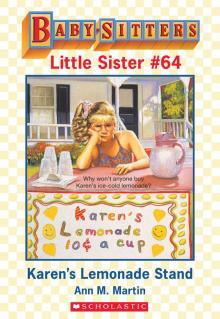 Karen's Lemonade Stand
Karen's Lemonade Stand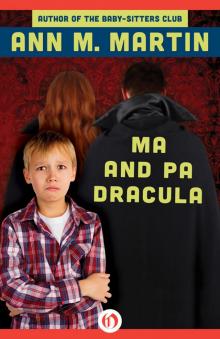 Ma and Pa Dracula
Ma and Pa Dracula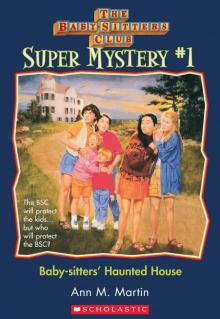 Baby-Sitters' Haunted House
Baby-Sitters' Haunted House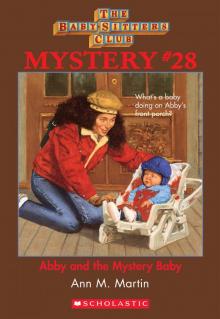 Abby and the Mystery Baby
Abby and the Mystery Baby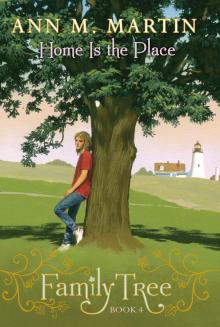 Home Is the Place
Home Is the Place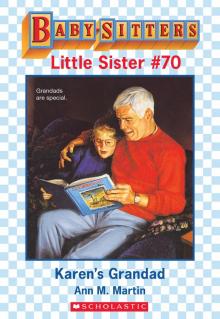 Karen's Grandad
Karen's Grandad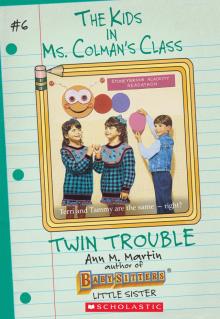 Twin Trouble
Twin Trouble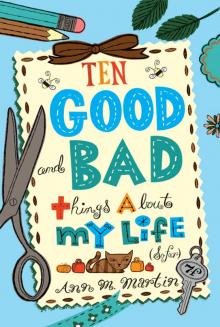 Ten Good and Bad Things About My Life (So Far)
Ten Good and Bad Things About My Life (So Far)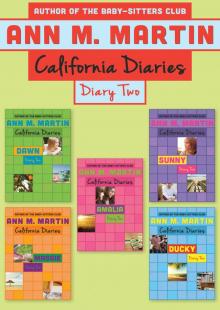 Diary Two
Diary Two Baby-Sitters Club 027
Baby-Sitters Club 027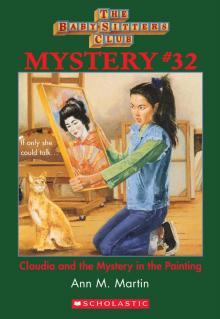 Claudia and the Mystery Painting
Claudia and the Mystery Painting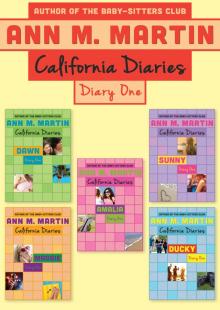 Diary One
Diary One Baby-Sitters Club 037
Baby-Sitters Club 037 Baby-Sitters Club 028
Baby-Sitters Club 028 Baby-Sitters Club 085
Baby-Sitters Club 085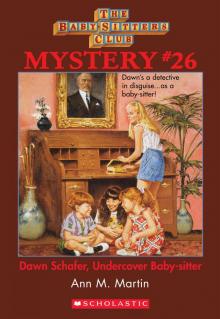 Dawn Schaffer Undercover Baby-Sitter
Dawn Schaffer Undercover Baby-Sitter Jessi's Babysitter
Jessi's Babysitter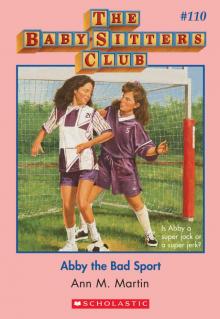 The Baby-Sitters Club #110: Abby the Bad Sport (Baby-Sitters Club, The)
The Baby-Sitters Club #110: Abby the Bad Sport (Baby-Sitters Club, The) Karen's Little Sister
Karen's Little Sister Baby-Sitters Club 058
Baby-Sitters Club 058 Claudia And The Genius On Elm St.
Claudia And The Genius On Elm St.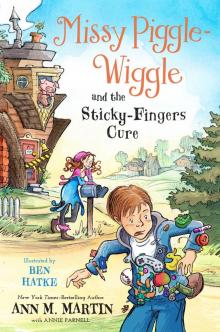 Missy Piggle-Wiggle and the Sticky-Fingers Cure
Missy Piggle-Wiggle and the Sticky-Fingers Cure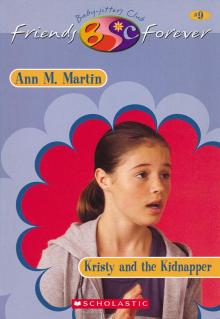 Kristy and Kidnapper
Kristy and Kidnapper Baby-Sitters Club 041
Baby-Sitters Club 041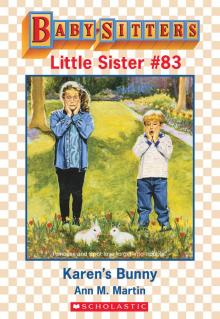 Karen's Bunny Trouble
Karen's Bunny Trouble Baby-Sitters Club 032
Baby-Sitters Club 032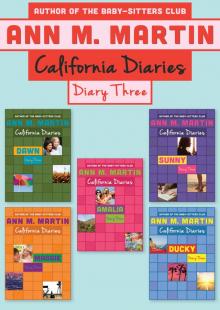 Diary Three
Diary Three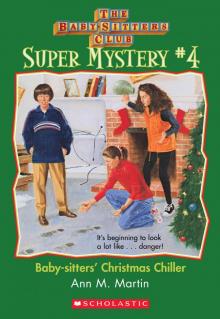 Christmas Chiller
Christmas Chiller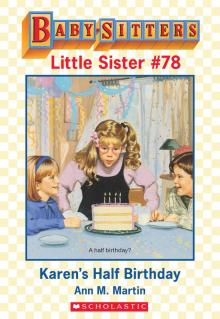 Karen's Half-Birthday
Karen's Half-Birthday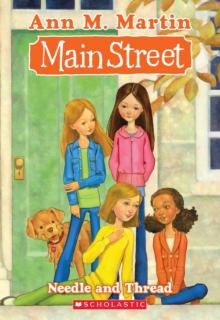 Needle and Thread
Needle and Thread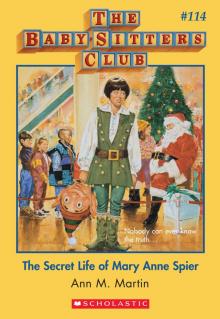 Secret Life of Mary Anne Spier
Secret Life of Mary Anne Spier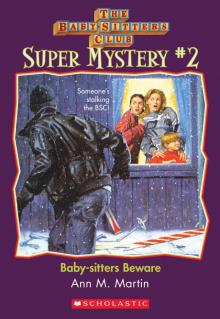 Baby-Sitters Beware
Baby-Sitters Beware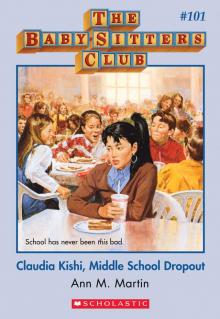 Claudia Kishi, Middle School Drop-Out
Claudia Kishi, Middle School Drop-Out Logan Likes Mary Anne !
Logan Likes Mary Anne ! Baby-Sitters Club 061
Baby-Sitters Club 061 Best Friends
Best Friends Baby-Sitters Club 031
Baby-Sitters Club 031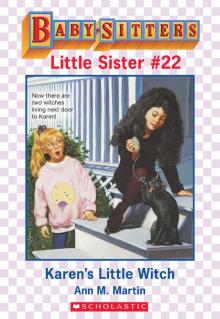 Karen's Little Witch
Karen's Little Witch Jessi Ramsey, Petsitter
Jessi Ramsey, Petsitter Baby-Sitters Club 123
Baby-Sitters Club 123 Baby-Sitters Club 059
Baby-Sitters Club 059 Baby-Sitters Club 033
Baby-Sitters Club 033 Baby-Sitters Club 060
Baby-Sitters Club 060 Baby-Sitters Club 094
Baby-Sitters Club 094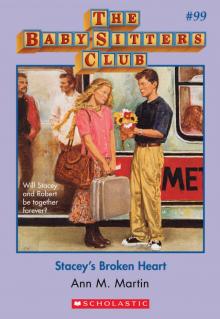 The Baby-Sitters Club #99: Stacey's Broken Heart
The Baby-Sitters Club #99: Stacey's Broken Heart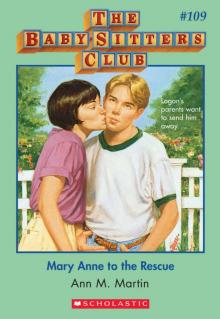 The Baby-Sitters Club #109: Mary Anne to the Rescue (Baby-Sitters Club, The)
The Baby-Sitters Club #109: Mary Anne to the Rescue (Baby-Sitters Club, The) Mystery At Claudia's House
Mystery At Claudia's House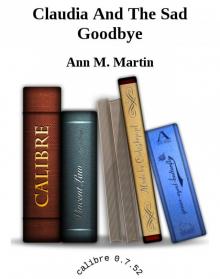 Claudia And The Sad Goodbye
Claudia And The Sad Goodbye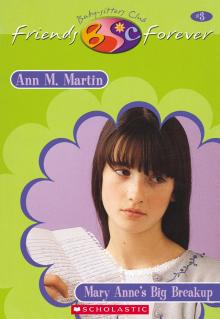 Mary Anne's Big Break-Up
Mary Anne's Big Break-Up Baby-Sitters Club 025
Baby-Sitters Club 025 Baby-Sitters Club 042
Baby-Sitters Club 042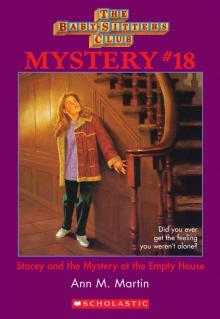 Stacey and the Mystery of the Empty House
Stacey and the Mystery of the Empty House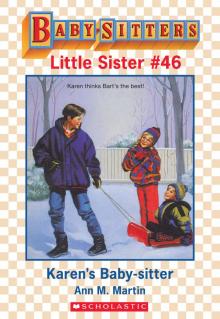 Karen's Baby-Sitter
Karen's Baby-Sitter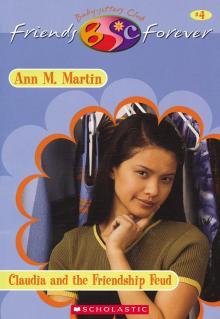 Claudia's Friendship Feud
Claudia's Friendship Feud Baby-Sitters Club 090
Baby-Sitters Club 090 Baby-Sitters Club 021
Baby-Sitters Club 021 Baby-Sitters Club 056
Baby-Sitters Club 056 Baby-Sitters Club 040
Baby-Sitters Club 040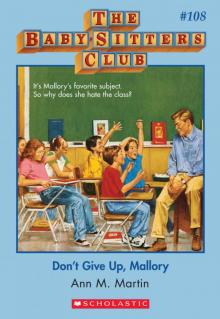 The Baby-Sitters Club #108: Don't Give Up, Mallory (Baby-Sitters Club, The)
The Baby-Sitters Club #108: Don't Give Up, Mallory (Baby-Sitters Club, The)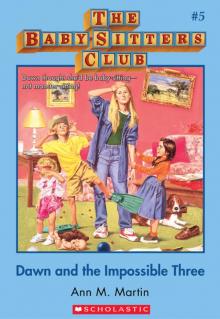 Dawn and the Impossible Three
Dawn and the Impossible Three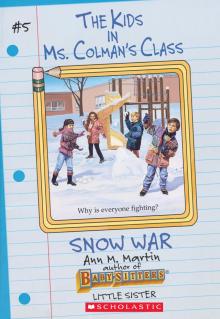 The Snow War
The Snow War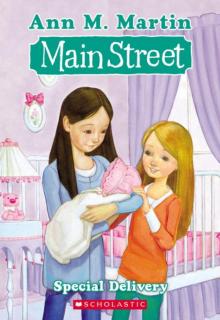 Special Delivery
Special Delivery Baby-Sitters Club 057
Baby-Sitters Club 057 Mary Anne And Too Many Babies
Mary Anne And Too Many Babies Baby-Sitters Club 030
Baby-Sitters Club 030